The Albums of My Life
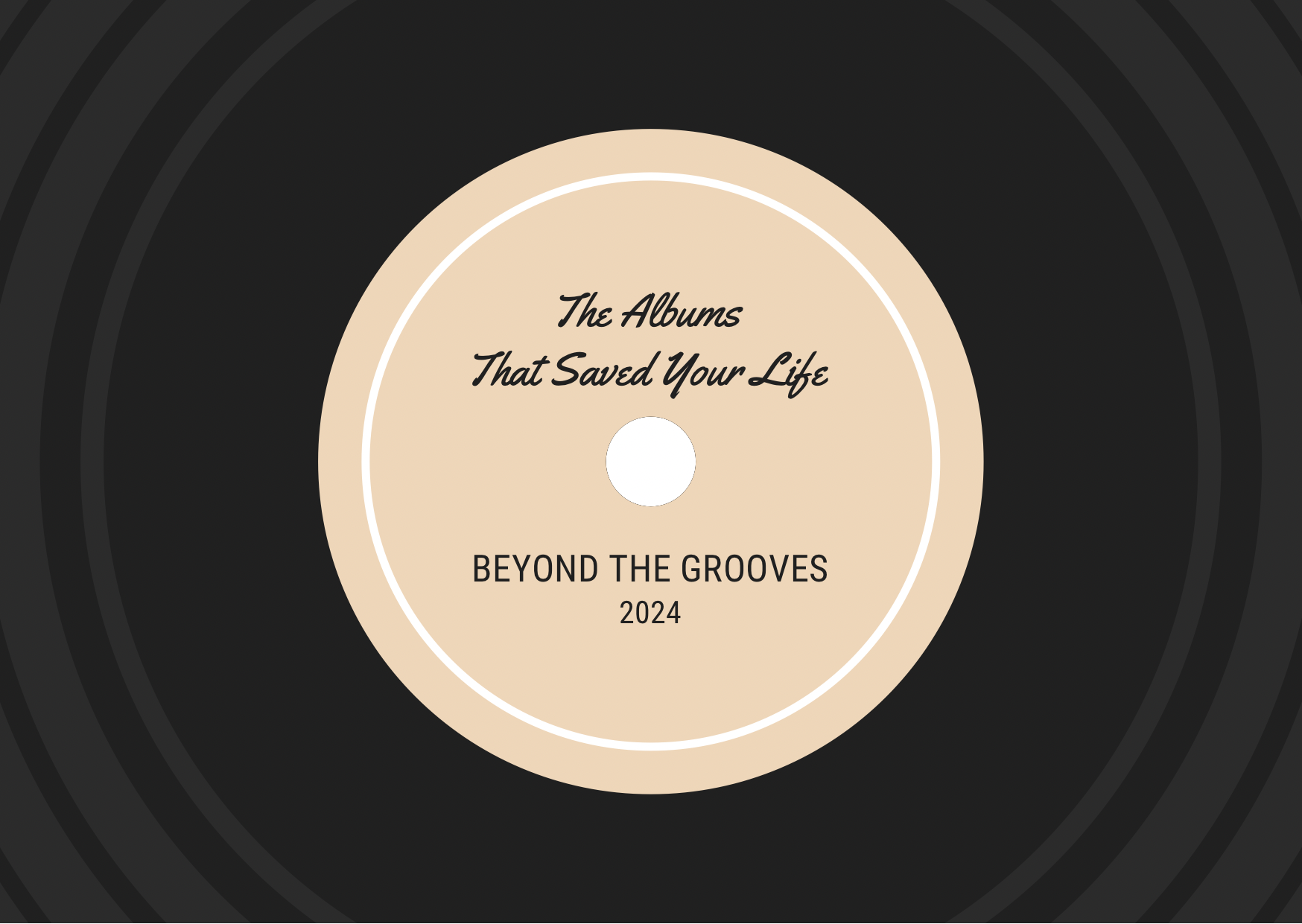
We did songs. Now its time for albums. 24 albums for 24 years. Expect some classics. Some modern day masterpieces.
So here goes…
Stereophonics- Word Gets Around
Those of you who know me well won’t be surprised to see a Stereophonics album on this list. What was surprising, though, was how hard it was to pick just one. Part of me was tempted to take the easy way out and go with 'Decade in the Sun', the band’s greatest hits collection. But I couldn’t do it. I narrowed it down to three albums, and after revisiting them all, this one stood out above the rest.
Their 1997 debut, 'Word Gets Around', is an album I always find myself returning to, along with its brilliant follow-up, 1999’s 'Performance & Cocktails'. But 'Word Gets Around' has something special. It’s a raw, honest introduction to a band rooted in their environment, telling stories from a small town in South Wales. It’s about the lives they knew and the people around them. There’s love, loss, crime, gossip, working jobs you hate, weddings, suicides, and the constant tension between feeling stuck and dreaming of something more. And yet, they did escape.
This is the record that put Stereophonics on the map, and it’s home to twelve of the best songs they’ve ever written. It kicks off with 'A Thousand Trees', a sharp, jangly tune that immediately grabs your attention—musically upbeat, but lyrically dark. It tells the story of a respected local figure whose reputation is destroyed by rumors and scandal. It’s that contrast, between how things look and what’s really going on, that sets the tone for the album.
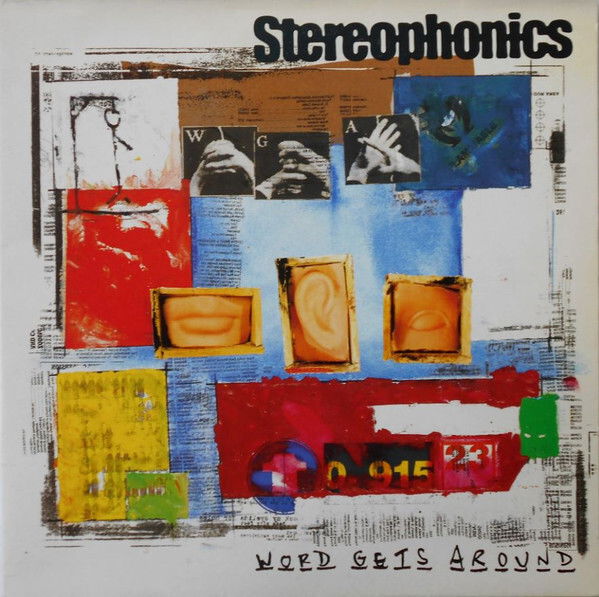
'More Life in a Tramp’s Vest' is one of the album’s most energetic tracks, packed with gritty riffs and small-town frustration. Told from the perspective of a market stall worker, it captures that restless sense of being stuck. Watching others move through life while you stand still. It’s mundane life turned into poetry, with a chorus that practically spits with sarcasm and grit.
'Local Boy in the Photograph' might just be the emotional centerpiece. It’s based on the true story of a young man from their hometown who died by jumping in front of a train, and it’s told with heartbreaking simplicity. The lyrics don’t try to offer answers, they just reflect on the lingering absence and the sudden finality of it all: “He'll always be twenty-three, yet the train runs on and on.” It’s a song about memory, about the way a face in a photograph can carry the weight of a whole life, and about the strange silence that follows a tragedy no one wants to talk about. There’s no sensationalism here. Just sadness, confusion, and a kind of poetic resignation. It’s one of those rare songs that feels heavier every time you hear it.
Then there's 'Traffic', a beautifully restrained track, almost cinematic in its melancholy. It captures those quiet, reflective moments in life being stuck in a traffic jam, watching the world and questioning the lives of those around you. There’s a line, “We all face the same way, still it takes all day” despite how different our lives are, the mundane tasks still ring true. Everyone is physically in the same situation but each of the songs characters is the star of their individual story, or stories.
The closer, 'Billy Davey’s Daughter'. It’s slow, haunting, and full of space, simiarly to 'Local Boy in the Photograph' the song tackles death again in a heartfelt way that does not offer any answers, instead asks more questions. It's really gritty but also one of the albums most senstive songs.
This record came out just as Britpop's bubble burst. Stereophonics we ahead of the curve songs of suicide, sexual abuse, suburban spinsterdom and smoky pub philosophies chimed with the uncertainty of life and the mundanity of certainty. The party was over. It's still arguably the best collection of songs the band ever wrote and recorded,
'Word Gets Around' has followed me throughout my life. It’s not just a favourite, it’s a record full of memories. It’s one of mine and my dad’s favourites, something we’ve bonded over for years. It feels like home. And no matter how many times I hear it, it still hits just as hard.
Oasis- Definitely Maybe
This was one of the easiest picks on the list. Definitely Maybe isn’t just the best Oasis record. In my opinion it’s one of the greatest albums ever released by a British band. It was the record that introduced Oasis to the world, and it features some of the finest songs Noel Gallagher has ever written.
From the defiant swagger of Rock ’n’ Roll Star, capturing the desire to escape mundane surroundings, to the anthemic hope of Live Forever, and the raw, aching beauty of Slide Away, arguably one of the greatest love songs ever written. Definitely Maybe is a collection of 11 incredible tracks that doesn’t waste a second. It’s punchy, direct, and unmistakably Oasis.
Track after track, the album delivers. 'Columbia' simmers with hypnotic repetition and attitude, while 'Cigarettes & Alcohol' is a raw, snarling anthem for the working class, borrowing glam rock riffs and injecting them with Mancunian grit. 'Up in the Sky' and 'Bring It on Down' are full of urgency and bite, and 'Supersonic', their debut single, still sounds fresh brimming with confidence and strange, surreal lyrics. Even the lesser-celebrated tracks like 'Digsy’s Dinner' add a kind of chaotic charm, grounding the album in a very real, unpolished, working-class world. It’s all killer, no filler.
The album wears its influences proudly. The Beatles, T. Rex, Slade, The Jam they’re all in there. Yet, it never feels derivative. It’s confident, loud, and uniquely theirs. A mix of punk energy, heartfelt ballads, and yes, even a song about lasagne, all held together by that unmistakable Oasis sound.
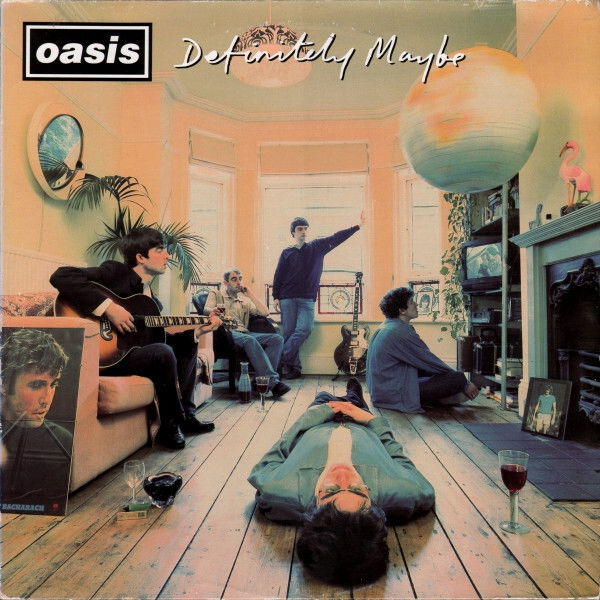
But beyond the sound, it’s about how these songs feel. The themes are timeless youthful ambition, defiance, hope. It’s a record brimming with belief, and that emotional core still resonates today. Young people in 2024 can relate to it just as much as those in 1994 did. Its impact is undeniable.
'What’s the Story Morning Glory' may be the album packed with the big hits, but ask most Oasis fans what their favourite album is, and chances are they’ll say 'Definitely Maybe'.
I was 14 or 15 when I first heard it, and it still hits just as hard today. It hasn’t lost a bit of its magic.
Arctic Monkeys- Suck It & See
Every Arctic Monkeys fan has a different answer when asked what their favourite album is. Some are loyal to the raw, energetic chaos of the debut. Others gravitate towards the dark, experimental corners of ‘Humbug’. Many swear by the swagger and nocturnal grooves of ‘AM’, while some have fallen in love with the conceptual, loungey weirdness of ‘Tranquillity Base Hotel & Casino’.
To me, though, ‘Suck It and See’ stands out for a different reason. It doesn’t come with the headline-grabbing reinvention of ‘Humbug’, or the chart-topping global appeal of ‘AM’. It didn’t stir up debates the way ‘Tranquility Base’ did. What it does offer is something far simpler, a collection of brilliant indie pop songs.
This is Arctic Monkeys at their most romantic, most melodic, and most effortlessly charming. There’s a breezy confidence to the whole record. It feels sun-drenched and cinematic. Alex Turner is in his element: witty, wistful, and razor sharp. The one-liners on this album are some of his best.
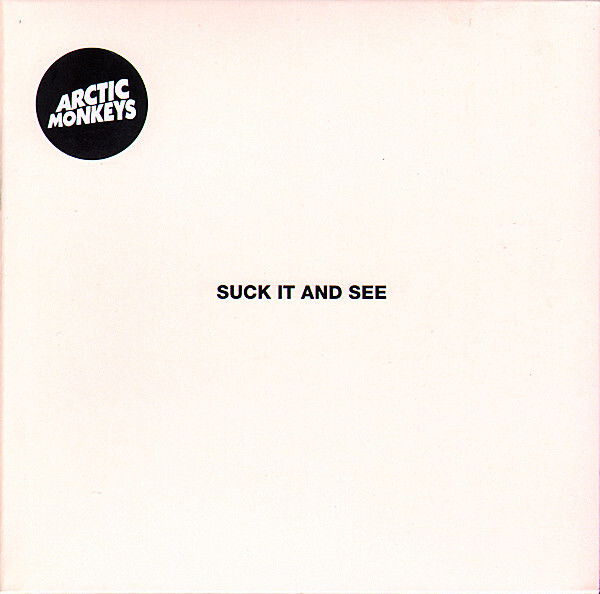
The title track ‘Suck It and See’ is a swooning love song, deceptively simple but soaked in longing and warmth. ‘Love Is a Laserquest’ takes that sentiment and goes deeper—one of Turner’s most introspective lyrics, a reflection on growing up and wondering whether love ever really stays the same. Then there’s ‘That’s Where You’re Wrong’, the perfect closer, all shimmering guitars and aching beauty. It might just be the most underrated track in their entire catalogue.
But it doesn’t stop there. ‘Reckless Serenade’ is pure indie-pop perfection, blending smooth hooks with lines that linger in your head for days. ‘She’s Thunderstorms’ is the album’s stormy opener, all crashing guitars and poetic menace. ‘Library Pictures’ throws back to the band’s early chaotic energy—frantic, cryptic, and full of swagger. And ‘Piledriver Waltz’, first heard in Turner’s Submarine soundtrack, fits perfectly here.
There’s no gimmick or concept holding this album together. Just great songwriting, tight musicianship, and a band completely comfortable in their own skin. It’s their most pop-leaning album, yes, but it’s also one of their most honest. No theatrics, no distractions, just a brilliant set of songs that reward repeat listens and slowly worm their way into your heart.
‘Suck It and See’ might not be the first Arctic Monkeys record that comes up in conversation, but for me, it’s the one I keep coming back to. It’s underrated, underappreciated, and quietly, confidently, one of their best.
The Beatles- Sgt Pepper’s Lonely Hearts Club Band
The Beatles have been a constant presence in my life for as long as I can remember. They’ve always just been there, like the sky or the sea. I was a child the first time I heard a Beatles song, probably playing from a car radio or maybe even at primary school. But the first time I really listened when I consciously chose to sit down and explore what they were about was as a teenager. And the first album I played was this one.
Sgt. Pepper’s Lonely Hearts Club Band’ immediately captivated me. The cover alone is a trip psychedelic, colourful, mysterious. It pulls you in. And then you press play, and it just blows your head off. I remember thinking: How is this from 1967? It didn’t sound like it belonged to that time or any time. It sounded like the future.
This album didn’t just change music. It changed what an album could even be. Before ‘Sgt. Pepper’s’, albums were often collections of singles and filler. After it, they were journeys, complete artistic statements. The Beatles redefined the rules. With this one record, they opened a door for concept albums, experimentation, and storytelling in music that still echoes through every genre today.
For me, ‘Sgt. Pepper’s’ was the key that unlocked the whole Beatles world. It made me dig deeper. I became fascinated, how did they make this album? Why did they decide to become a fictional band? That rabbit hole led me to discover how the band quit touring, how they embraced the studio as an instrument, how Abbey Road became their playground. It’s a story full of creative freedom, tension, innovation, and joy. It’s as legendary as the music itself.
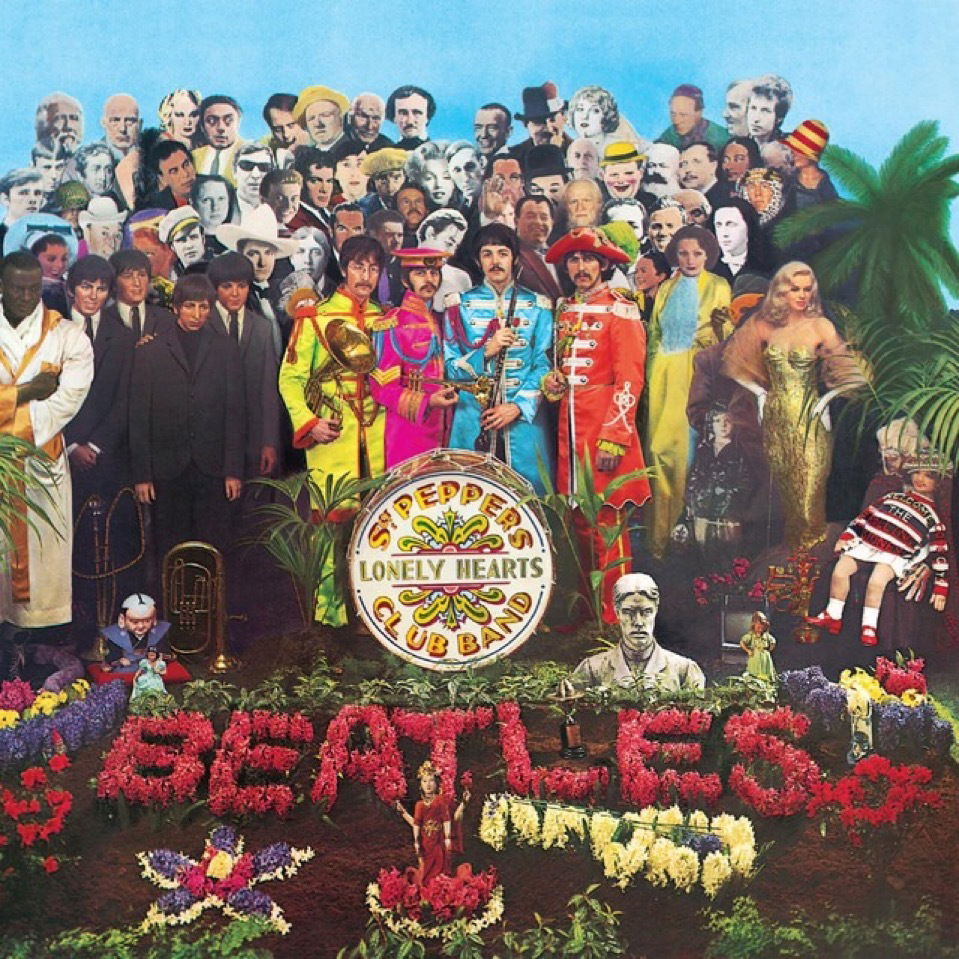
And the songs, every single one of them is iconic. The opening title track ‘Sgt. Pepper’s Lonely Hearts Club Band’ sets the tone with rock theatre flair, introducing the idea of this fictional band. Then comes ‘With a Little Help from My Friends’, a perfect slice of optimism and camaraderie delivered in Ringo’s warm voice. ‘Lucy in the Sky with Diamonds’ is a kaleidoscope of surreal imagery and dreamy melodies music as art, pure and unfiltered.
‘Getting Better’, ‘Fixing a Hole’, and ‘Being for the Benefit of Mr. Kite!’ each bring their own unique flavour, blending pop, vaudeville, and circus-like soundscapes in ways no one had done before. ‘She’s Leaving Home’ might be one of the most heartbreaking songs they ever wrote—stripped back, beautifully orchestrated, and emotionally resonant. And then there’s ‘A Day in the Life’ a song that feels like the entire 1960s condensed into five minutes.
It’s one of the most important albums ever made, no question. But beyond that, it’s personal. ‘Sgt. Pepper’s’ was my introduction to really hearing The Beatles not just as a band with catchy songs, but as visionaries. It’s the record that pulled back the curtain and showed me just how powerful music could be.
It had to be on this list. There was never a question. It’s not just one of the greatest albums of all time, it’s the album that changed everything.
Blossoms- Blossoms
Another debut album—there’s a theme here, clearly. ‘Blossoms’ came out when I was 16, and maybe that’s why it’s always meant so much to me. That age is such a formative time, you’re figuring out who you are, what you like, what matters to you. For me, this album was part of that discovery. It didn’t just soundtrack a time in my life, it helped shape it.
But aside from what it means to me personally, this is also just a brilliant record. A debut that’s bold, confident, and unashamedly pop at times. The five lads from Stockport managed to create something that felt nostalgic and fresh at the same time. Taking in influences from across the musical spectrum, from Oasis to ABBA, synth-pop to jangly indie. The result? An album that’s cohesive, catchy, and completely their own.
Opener ‘Charlemagne’ is probably the most iconic song here jangly guitars, an instantly memorable chorus, and that retro feel that would become their trademark. It’s the song that really introduced Blossoms to the world and remains a fan favourite for good reason. Then there’s ‘At Most a Kiss’, which leans into darker, moodier territory, showcasing a deeper layer of their sound.
The synth-laced shimmer of ‘Honey Sweet’ still feels like the perfect summer track—effortlessly cool, upbeat, and bursting with pop charm. ‘Blown Rose’ shows off the band’s romantic side, full of longing and cinematic flair, while ‘Smashed Pianos’ gives the album a grittier, more intense edge.
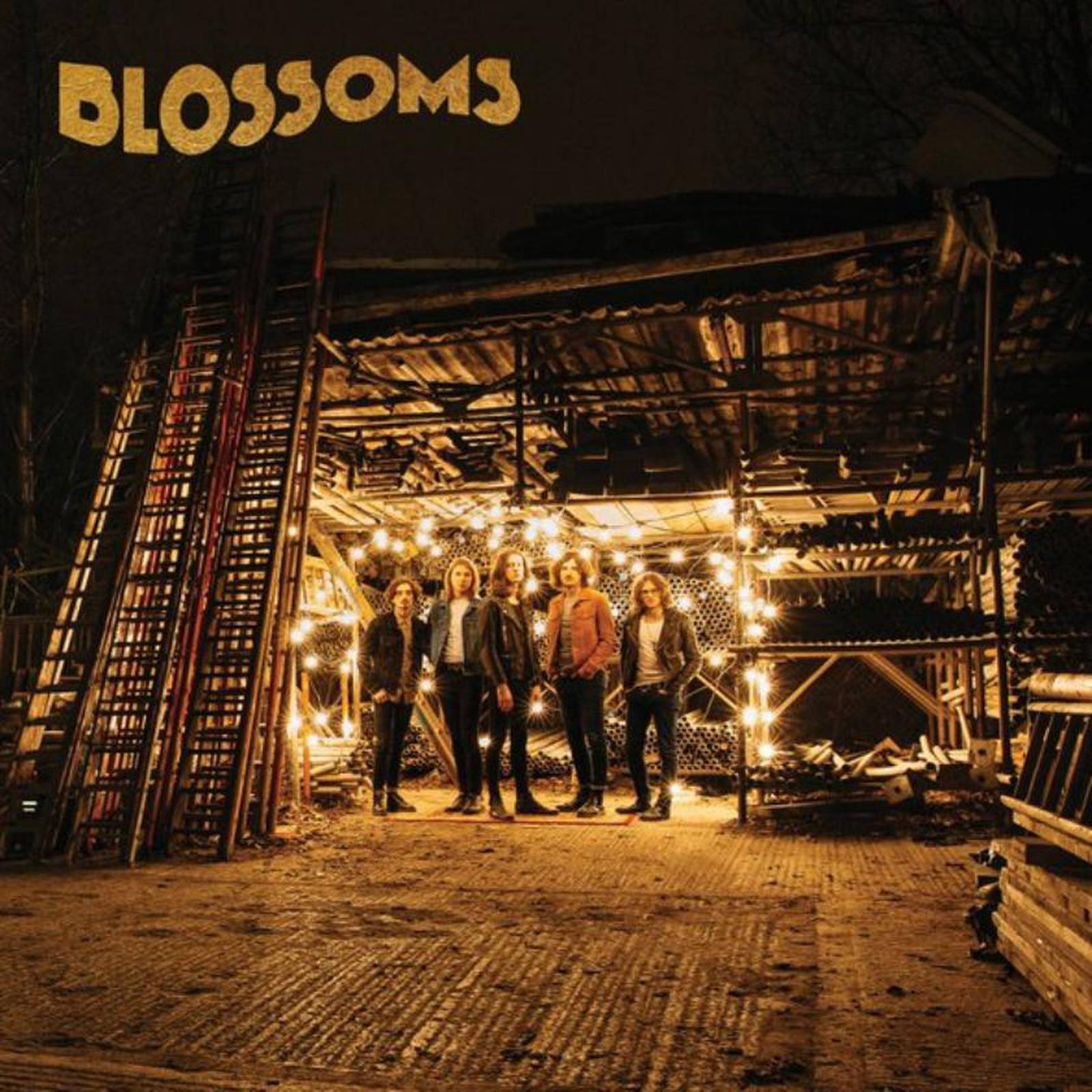
One of the standout emotional moments comes with ‘My Favourite Room’. Stripped back, acoustic-led, and completely raw, it’s a heartbreak anthem without being over-the-top. Just Tom Ogden and a guitar, telling a story we’ve all lived in some way or another. It’s those quieter moments that really show what Blossoms can do beyond the pop hooks.
And that’s what makes this album so strong, it’s got range. From the euphoric to the melancholic, from indie bangers to tearjerkers, it covers all bases without ever feeling like it’s trying too hard. Every track feels like it belongs.
Over the years, Blossoms have grown in sound and ambition, but I always find myself coming back to this record. There’s something about the simplicity, the honesty, and the energy of a debut that you just can’t replicate. It’s the Blossoms album that’s stuck with me the most. The band have gone on to become a huge part of my musical journey they’re the band I’ve seen live more than anyone else.
And it all started with this album, eight years ago. Somehow, it still sounds just as fresh today. For me, it’s their best work.
Wolf Alice- Blue Weekend
This album had to make the list. When ‘Blue Weekend’ was announced, it had been four years since Wolf Alice had released a new record. Their previous album, ‘Visions of a Life’, had won the Mercury Prize and elevated them into one of the most exciting bands in Britain. Their debut, ‘My Love Is Cool’, had already established a strong foundation, but ‘Visions of a Life’ took everything up a level. Sonically, lyrically, emotionally. Naturally, expectations for album number three were sky high. I was nervous. Could they really top what they’d already done?
Believe me, I wasn’t disappointed. Not even close.
People often throw the word “masterpiece” around, but ‘Blue Weekend’ genuinely earns that title. It’s a bold, confident, emotionally rich record. One that cements Wolf Alice as one of the most important British bands of their generation. It’s a perfectly crafted collection of songs, and in my opinion, it’s the best thing they’ve ever done.
Across its 11 tracks, the album sees the band fully come into their own. From the snarling, punchy opener ‘Smile’, which bursts with controlled chaos and a defiant edge, to the delicate piano-led ballad ‘The Last Man on Earth’, it’s the sound of a band operating at their absolute peak. This album is more introspective than their previous efforts—turning inward to explore love, identity, isolation, friendship, insecurity, and self-worth. It’s mature, raw, and utterly captivating.
Tracks like ‘Lipstick on the Glass’ float with a haunting elegance, Ellie Rowsell’s vocals soaring above shimmering instrumentation. It’s a track full of longing and reflection, delicate but powerful. Meanwhile, ‘Safe from Heartbreak (if you never fall in love)’ brings in folk textures and glistening harmonies, showcasing the band’s versatility and restraint. It’s deceptively simple and incredibly effective.

Then there’s ‘How Can I Make It OK?’—an emotional centrepiece that builds from vulnerability into a cathartic chorus, full of sweeping synths and pounding drums. It’s one of the album’s many standout moments and one of the most moving songs they’ve ever written.
On the heavier side, ‘Play the Greatest Hits’ is a frenzied burst of punk chaos—short, sharp, and full of attitude. It contrasts beautifully with the quieter moments, showing off the band’s ability to jump between sonic extremes without ever losing cohesion.
The final stretch of the album hits even harder. ‘No Hard Feelings’ is a minimalist, heartbreaking song about the aftermath of a breakup. It’s full of grace and acceptance, one of those rare songs that feels like a whispered conversation with yourself. And then ‘The Beach II’ closes the record out with a swelling, cinematic finish, tying the album together in a wave of emotion and reflection.
‘Blue Weekend’ received widespread critical acclaim, and rightly so. It’s a rare thing to see a band continuously raise the bar with every record, but Wolf Alice have done exactly that. They’ve grown in every sense: more expansive, more refined, more daring. It’s their best work to date and one of the standout albums of the 2020s so far.
I love this record. It’s stayed with me since the day it came out, and it’s one of those albums that reveals something new with every listen. For me, it had to make the list. It’s a modern classic.
Fleetwood Mac- Rumours
This album is always featured in lists of the Greatest Albums of All Time, and it’s almost always near the top, and with good reason. It’s a collection of 11 tracks penned by one of the best bands to ever do it, created under circumstances that shouldn’t have worked for making an album. With sessions marred by band breakups, addiction struggles, and deep personal tensions, it’s nothing short of a miracle that this album even came to fruition.
But perhaps it’s these fraught relationships between the band members that actually make the songs so compelling. Each track feels like a chapter in the Fleetwood Mac saga, infused with personal turmoil, heartbreak, and passion. You can almost hear the emotional weight in the music, which, in turn, made it resonate with so many listeners around the world.
Since its release, this album has sold a staggering 21 million copies, going 21x platinum. A testament to its enduring universal impact. It’s a blueprint for what a great album should be: cohesive, memorable, and bursting with emotion. And what’s even more remarkable is that there isn’t a weak song on it. Each member of Fleetwood Mac brings something essential to the table, contributing to the album’s unique sound and legacy. It’s a record that will undoubtedly stand the test of time.
The singles alone are iconic: 'Dreams', 'Go Your Own Way', 'You Make Loving Fun', and 'The Chain' are staples of the band’s catalog and staples of popular music. These songs continue to be celebrated and loved by new generations, proving the timelessness of Fleetwood Mac’s work. 'Dreams', with its soft yet powerful vocals from Stevie Nicks, remains one of the most beautifully haunting songs in rock history, and 'Go Your Own Way' captures the raw emotion and heartbreak that defined the band’s personal struggles. 'You Make Loving Fun', a lighter, more upbeat song, shows off Christine McVie’s songwriting strength, while 'The Chain', with its unforgettable bassline and collective effort from all band members, remains a masterclass in building tension and release.
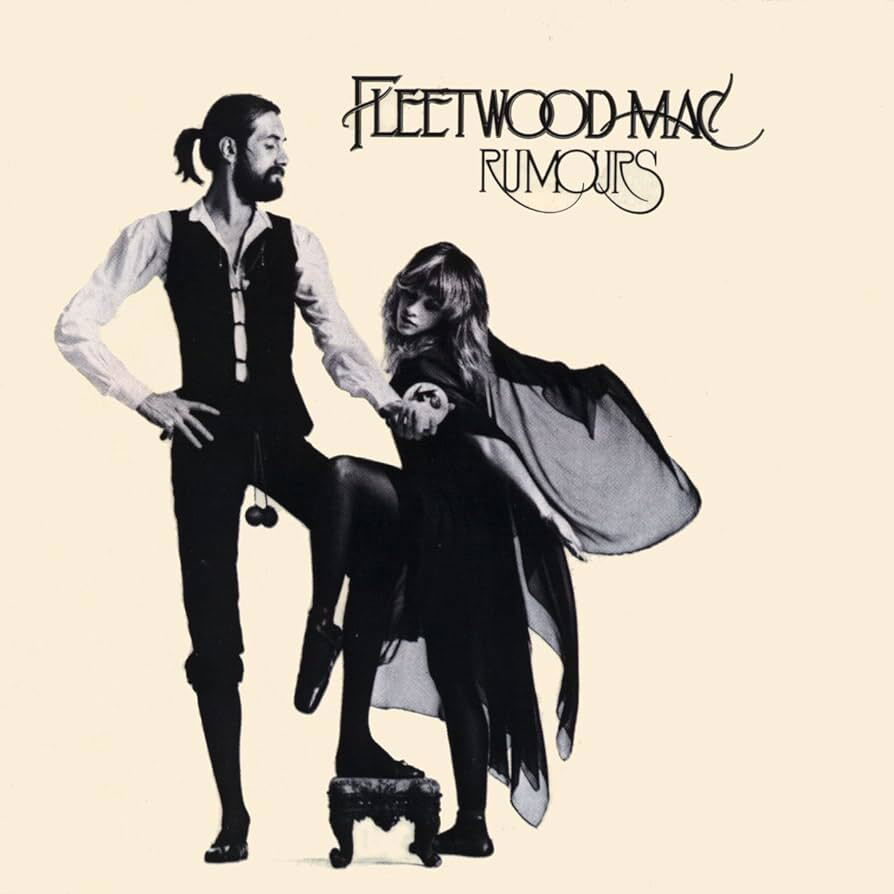
But this album isn’t just about the hits. It’s about the entirety of the experience. 'The Chain', for example, is much more than a standout single; it represents the band’s complex relationships with each other. The track’s famous bassline played by John McVie, anchors the song, and its gradual buildup mirrors the internal strife and eventual reconciliation that defined Fleetwood Mac’s journey. The collective energy of this track and the entire album speaks to the way that pain and conflict can be transformed into something incredibly powerful, something that transcends the personal.
Christine McVie’s 'Songbird' is another highlight. A soft, piano-driven ballad, it captures the emotional vulnerability of the album in a way that’s simple yet devastatingly effective. Its simplicity works to its advantage, allowing the emotional depth of McVie’s lyrics and delivery to take center stage. It's one of the album’s quieter moments, yet it speaks volumes in its restrained beauty.
This album is a touchstone, a masterpiece that changed the landscape of rock and pop. The songs on this record hold personal meaning for me as well. It soundtracked my late teens and early twenties, providing the soundtrack to many formative moments. While I don’t listen to it constantly, every time I put it on, I remind myself just how incredible it is and I always think I should listen to it more. It’s a timeless album that continues to inspire, and it’s a record that deserves to be revisited over and over again.
Fleetwood Mac’s 'Rumours' is not just an album. It’s an enduring cultural artifact. A real masterpiece that will always remain relevant, no matter how much time passes.
Circa Waves- Different Creatures
This album is criminally underrated. Upon its release, it quickly became one of my favourite albums of 2017, and in 2025, it remains one of my all-time favourites.
On this album, Circa Waves upped the tempo and turned up the volume. It’s a much heavier affair compared to their debut, 'Young Chasers', showcasing a bold new direction for the band. The sound is fuller, more aggressive, and yet still retains the melodic charm that made their earlier work so appealing.
With 11 songs and a run time of 40 minutes, this record doesn’t hang around. Despite its relatively brief length, it manages to pack in a lot, tackling big themes with beautiful instrumentation and massive choruses that will stay with you long after the album ends.
Circa Waves proved on this record that they weren’t just a one-trick pony. Their evolution in sound was a smart move, and it allowed the songs to breathe. The band explored both the quieter, more reflective moments and the raucous, energetic tracks that get your heart pumping. This range is especially evident on tracks like 'Old Friends', where they slow things down to deliver one of their finest ballads. As the album’s closing track, 'Old Friends' is a tear-jerker, exploring the bittersweet nature of relationships and how time and life’s changes can cause us to drift apart. It’s a moving, heartfelt piece that adds emotional depth to an album already full of heart.
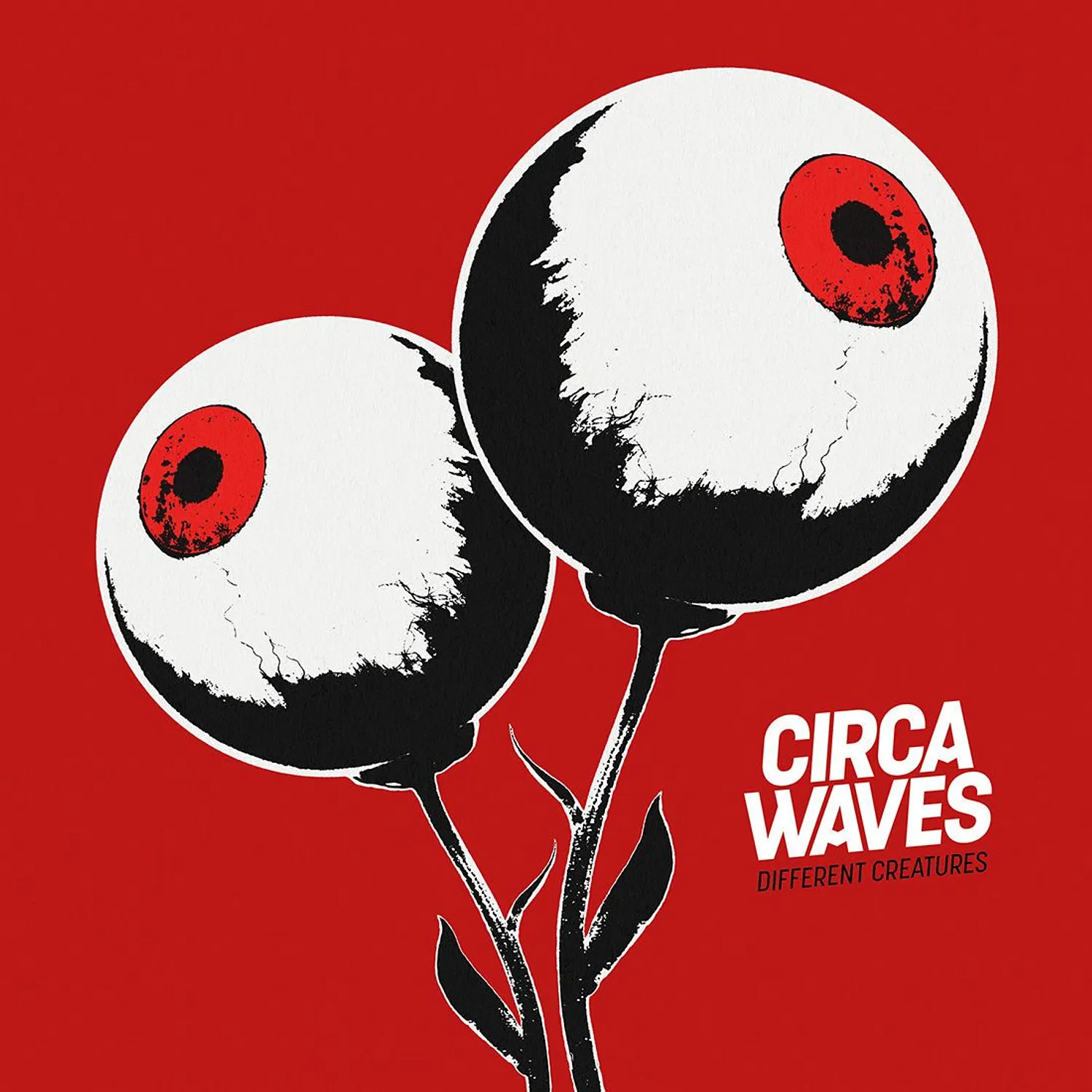
Beyond 'Old Friends', there are other standout tracks that demonstrate the band’s ability to write anthemic, stadium-ready songs with thoughtful lyrics. 'Different Creatures', the title track, opens the album with infectious energy, driven by sharp, angular guitar riffs and a chorus that's impossible not to sing along to. It perfectly sets the tone for the rest of the album.
'Wake Up', another highlight, brings the raw energy and an urgency that’s impossible to ignore. It’s a song about self-discovery and the feeling of waking up to the reality of life. With its pulsing rhythm and crashing cymbals, it’s a track that demands attention and evokes a feeling of urgency, perfectly matching the theme of awakening to the challenges of life.
This record isn’t just about volume and tempo. It’s about depth and maturity. Circa Waves found a way to make their music feel expansive without losing the intimacy that originally made them so special. The combination of upbeat, high-energy tracks with more reflective, slower moments shows the band’s range, and the result is a truly dynamic record.
In the end, this album stands as a testament to Circa Waves' growth as a band. They’ve evolved from their indie-pop roots to create something more polished, more powerful, and more emotionally resonant. It’s an album that doesn't shy away from exploring important subjects, from relationships to self-reflection, and it does so with beautiful instrumentation and massive, sing-along choruses.
Shack- HMS Fable
I feel obliged to talk about this record because it truly doesn’t get the credit it deserves. Released at the tail end of the 1990s by a band from Liverpool, 'HMS Fable' is a collection of brilliant ideas and fantastic songs, crafted by the incredibly talented Michael Head. A man the NME once dubbed Britain’s best songwriter.
'HMS Fable' is filled with nods to some of the most influential musical acts in history, like The Beatles, The Byrds, Love, and The Velvet Underground. This album is a testament to majestic storytelling, conveyed through rich, layered guitars and deeply personal lyrics. It rivals anything else that has come out of Liverpool, a city renowned for producing some of the greatest musical talent in the world.
The story behind Michael Head and Shack’s music is not without its darker elements. The band’s history is marred by substance abuse, particularly heroin, and this is something Michael Head doesn’t shy away from on 'HMS Fable'. Two tracks on the album, 'Streets of Kenny' and 'Lend Some Dough', tackle addiction head-on. These songs paint a brutally honest and vivid picture of life living with heroin. There’s no glamorization here. Instead, Shack offers a stark, raw portrayal of addiction’s grip, shining a light on the struggles and devastating realities that come with it.
But 'HMS Fable' is not solely defined by its darkness. The album is also a vibrant collection of musical beauty, with tracks that range from dreamy and reflective to upbeat and infectious. 'Comedy' stands out with its jangly guitars and intricate melodies, recalling the sounds of '60s pop while still feeling fresh and modern. It's one of the more optimistic moments on the record, a track that captures the band's ability to infuse their music with both nostalgia and innovation.
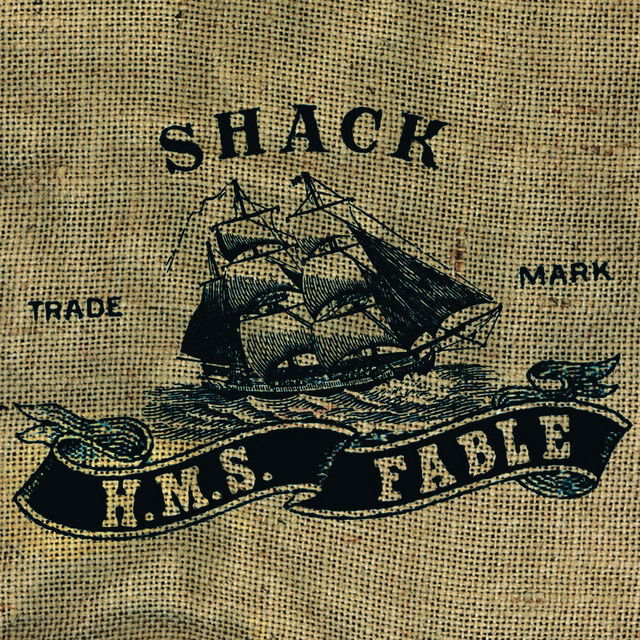
The depth of emotion and the vivid storytelling on this record make it a masterpiece. Liverpool has produced some of the finest songwriters and most compelling characters in music, from McCartney, Lennon, and Harrison, to McCullough, Mavers, and Broudie. Michael Head belongs firmly in this illustrious list. His work on 'HMS Fable' cements his place among the greats, showing the world his exceptional songwriting craft and emotional depth.
I first discovered this album tucked away in the 1001 Albums You Must Hear Before You Die book. As the book rightly suggested, it’s a record you need to listen to. It’s absolutely spectacular. A true gem in the landscape of British music.
'HMS Fable' is a record that stands the test of time. Michael Head, along with John Head, Ren Parry, and Ian Templeton, gave us one of the best British albums ever made. If you haven’t already heard it, you’re missing out on something truly special. And just to make sure you don’t miss out on even more brilliance, their predecessor album, 'Waterpistol', is equally fantastic.
There you go. Two albums for the price of one!
The Stone Roses- The Stone Roses
I always feel a bit strange talking about 'The Stone Roses'. It’s been discussed to death. By music journalists, indie kids, and fans all over the world. Routinely hailed as one of the best debut albums ever, and often classified as one of the greatest British albums of all time, this album has been dissected more times than most of the others on this list combined.
But it would be unfair to dismiss it just because of that. Away from the hype, 'The Stone Roses' is a superb album, a snapshot of a specific time, yet filled with songs that still feel fresh and timeless. It holds up as an iconic piece of music history and continues to resonate with listeners today.
What fuels this album more than anything is the band's sheer self-belief. Ian Brown, John Squire, Gary 'Mani' Mountfield, and Ian 'Reni' Wren had one overriding thought: they truly believed they were going to be bigger than The Beatles. And that confidence shines through every track, every chord, every lyric. It's this unshakeable conviction that makes 'The Stone Roses' feel like a bold declaration of not just musical greatness, but of a cultural revolution waiting to happen.
Listening to this album is like being transported back to 1989, to the heart of Madchester. Yet somehow, even in 2025, it still sounds modern and fresh. There’s a timeless quality to it, an ability to resonate across generations—that makes it every bit as iconic now as it was then.
The cover, featuring a pair of lemons, has its own fascinating backstory. It came about after a conversation with a man in Paris who’d been at the student riots in the 60s. He’d learned that the lemon could counteract the effects of tear gas, so he carried one with him at all times just in case. That small detail, and the inclusion of the French flag, serves as an intriguing symbol of rebellion and resistance.
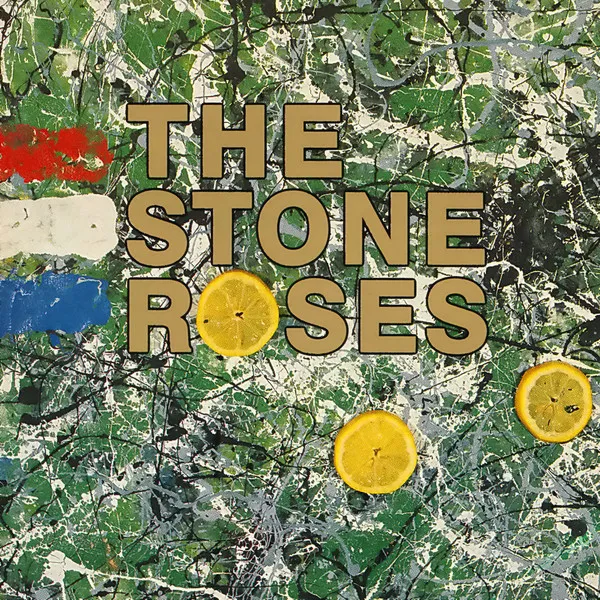
When it comes to the songs, you only need to listen to the first three tracks. 'I Wanna Be Adored', 'She Bangs the Drums', and 'Waterfall', to understand just how special this album is. That opening side alone announces their arrival in a way that very few bands can. 'I Wanna Be Adored' is the band's manifesto, with its haunting bassline and aggressive declaration of self-worth. 'She Bangs the Drums' is an infectious burst of energy, capturing the youthful exuberance and swagger that defined the band, while 'Waterfall' is a more introspective track, blending psychedelic elements with emotional depth, showing their versatility.
'Made of Stone' brings a gritty, driving rock sound with a wall of guitars and a chorus that demands to be shouted along to. 'This Is the One' is another standout, with a beautifully layered instrumental backdrop that complements the lyrics about love and destiny. 'I Am the Resurrection' is the album’s powerful closer, a song that builds in intensity before exploding into a raucous, cathartic finish. A perfect ending to a record that’s brimming with confidence and purpose. Each track contributes to the overall feeling of the album as a bold statement of musical brilliance, and collectively, they make 'The Stone Roses' an album that remains as vital and electrifying today as it was when it was first released.
The self-belief and brilliant songwriting have been embraced by teenagers across generations. You listen to this record, and you can't help but feel inspired. In 1989, it was a glimmer of color in a rather grey time; today, in 2024, it still feels like a breath of fresh air. Not much has changed in that respect.
'The Stone Roses' may not have bloomed for long, but this album has certainly stood the test of time. Despite their relatively brief career, the band captured something in this record that continues to influence music and culture to this day.
None of what I’ve said here is anything new it’s been said hundreds of times before. But every word rings true. If for some reason you haven’t yet, go and listen to it. 'The Stone Roses' will always be a masterpiece, and its legacy is undeniable.The influence of 'The Stone Roses' on British music cannot be overstated. They were at the forefront of the Manchester scene, and their impact extended far beyond their brief career. The album’s fusion of jangly guitars, danceable rhythms, and acid-influenced psychedelia helped to shape the sound of the '90s, paving the way for the rise of Britpop. Bands like Oasis, Blur, and The Verve were deeply influenced by the Roses' combination of swagger and melody. Even later down the line, Arctic Monkeys, Kasabian, Blossoms, Courteeners, Wolf Alice, Tame Impala can all say that they have been influenced by the Roses.
This album is one of the most culturally significant albums ever recorded.
Catfish & the Bottlemen- The Balcony
'The Balcony' is an album about relationships, drinking, breakups, and nights out. Basically it's about being young and working class. But here's the thing it's a very good record. Catfish and the Bottlemen may still be one of the biggest talking points in British music today, but ten years ago, they were indie upstarts with just one debut album to their name.
At just 37 minutes, 'The Balcony' delivers 11 snarling, fast-paced anthems. It wasn’t crafted for quiet, introspective listening; it was made to be blasted through speakers, with crowds chanting and bellowing the lyrics in a field, feeling the music pulse through their veins.
While they've had their critics, including myself at times, this remains the band's best record. It’s the sound of a band who knew exactly how good they were. In 2014, no one else was making music like this. Not for their debut album, anyway!
Tracks like 'Cocoon' and 'Pacifier' are prime examples of why this album struck such a chord. 'Cocoon' opens with a driving, raw energy, capturing the tension and passion of a relationship in turmoil, with catchy riffs that make it impossible not to sing along. Meanwhile, 'Pacifier' showcases the band's ability to blend introspection with anthem-like energy, frustration and defiance wrapped in a simple yet powerful chorus. It’s raw, visceral, and undeniably anthemic. This is a record full of youthful vigor, a snapshot of that time when everything feels urgent, and every night out has the potential to change your life.
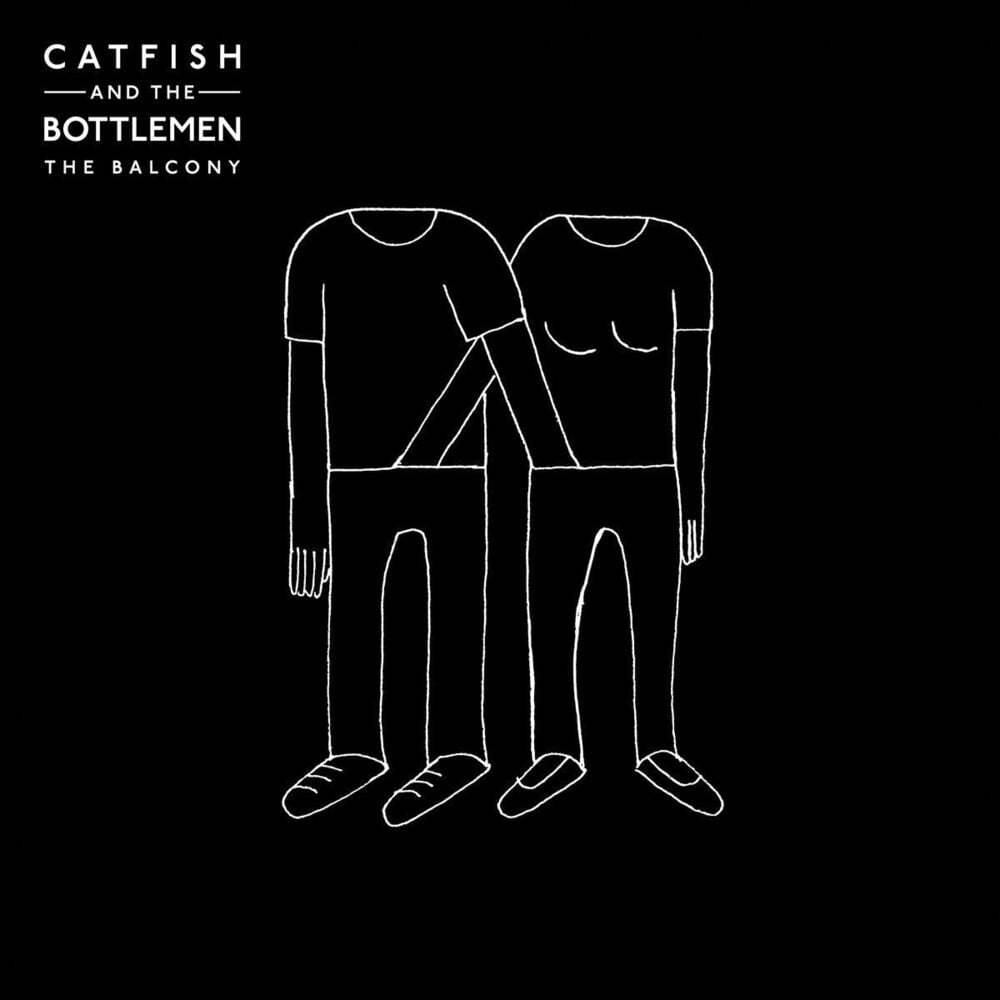
'Homesick' stands as a perfect example of the band’s ability to craft anthems with an edge. The song’s jangly guitar riffs and infectious melody make it one of the catchiest tracks on the album, while the lyrics dig into the feeling of restlessness that comes with being away from home, yet knowing you have to leave. 'Tyrants' is another high-energy moment, a bit more chaotic in its rhythm and urgency. It’s a declaration of frustration and rebellion, capturing that all-too-familiar feeling of defiance against anything that feels too controlled. Then there’s 'Sidewinder', which has a slightly more relaxed, almost dreamy vibe compared to the other tracks but still packs plenty of punch in its driving beat and heartfelt lyrics about longing and love
For me, 'The Balcony' is one of the very best records of the 2010s. It’s a record that perfectly soundtracked my teenage years, my GCSEs, A-Levels, and all the moments in between. It was the album that I blared out of my headphones, that captured my frustrations, dreams, and everything I was trying to figure out. It’s more than just a collection of songs; it’s a time capsule of youth, of a moment in time. It's also a record that made a generation start to take notice of guitar music again.
So, of course, it had to make the list. This album still holds a special place in my heart, and I believe it will always stand as the defining moment of Catfish and the Bottlemen’s career.
Peter Gabriel- So
The 80s were an extraordinary time for music, and in my opinion, this album stands as the crowning jewel of that decade, as well as the pinnacle of an already impressive discography.
On 'So', Peter Gabriel truly broke free from his prog-rock roots, marking a decisive shift toward a more accessible and experimental pop sound. If he hadn't already done so on his previous solo work. This album is a masterclass in pop music, blending cutting-edge technology and a bold willingness to explore new sounds.
With 'So', Gabriel delivered his biggest hit, 'Sledgehammer', a track that defined the era with its funky rhythms, infectious energy, and iconic music video. But the album doesn’t just stop there. Gabriel also collaborated with one of the biggest stars in music at the time, Kate Bush, on the emotionally powerful 'Don't Give Up'. The track is a beautiful, haunting duet about support and resilience in the face of hardship, showcasing Gabriel’s vulnerability and Bush’s ethereal voice.
Then there's 'Big Time', where Gabriel fully embraced his popstar persona, delivering an upbeat, cheeky anthem that pokes fun at fame and excess, all wrapped in an irresistibly catchy hook.
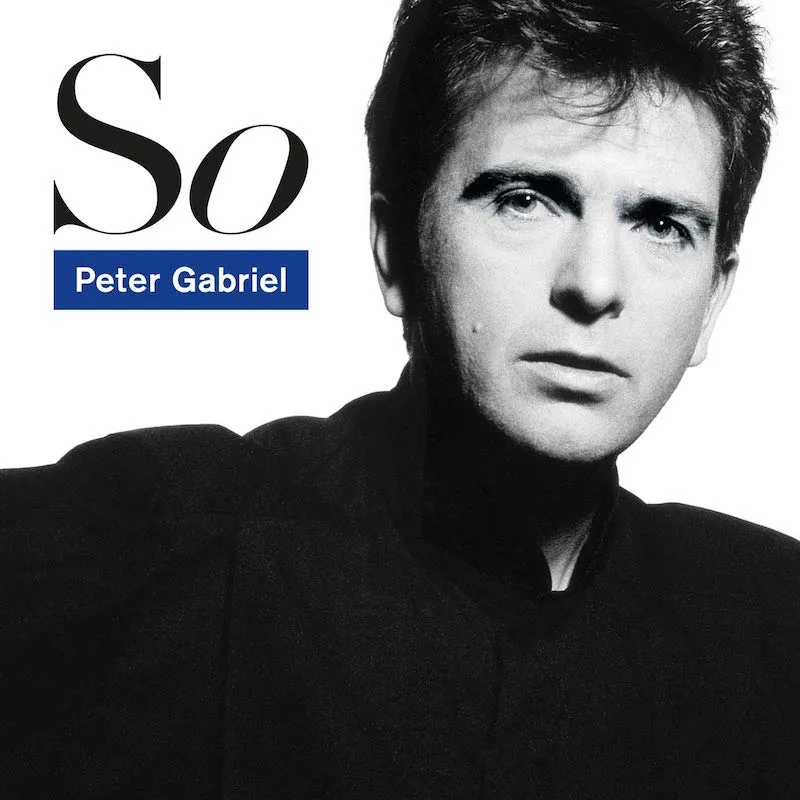
But beyond the hits, 'So' is filled with some of Gabriel's finest, most poignant work. 'In Your Eyes' is arguably one of his greatest songs, an emotionally rich ballad that’s both soulful and stirring. Its soaring chorus and heartfelt lyrics make it a song that resonates deeply with listeners, its beauty lying in its simplicity and sincerity. 'That Voice Again' is another standout, exploring themes of obsession and longing, its haunting atmosphere underpinned by a driving, almost hypnotic rhythm. Meanwhile, 'Red Rain' kicks off the album with an intense, atmospheric track that blends raw emotion with sophisticated production, dealing with personal and political turmoil in a way that feels both urgent and timeless.
Musically, 'So' is an adventurous, emotive journey. It blends a wide range of genres—from pop and rock to world music and R&B. Creating something that sounds unlike anything that came before or since. Gabriel’s use of layered sounds, experimental techniques, and state-of-the-art technology was groundbreaking, setting a new standard for how music could be crafted. His collaboration with some of the best musicians of the time: Stewart Copeland, Nile Rodgers, Jim Kerr, Laurie Anderson, and of course, Kate Bush, further elevated the album, adding depth and texture to its already rich sound.
For me, 'So' is more than just an album; it's one of my favorites of all time. It completely changed the way I view music and albums in general. I began to open myself up to new genres and ideas, embracing a broader spectrum of sounds and influences. It wasn’t just an album I listened to; it was a record that helped shape my musical perspective.
I was lucky enough to pick up an original 1986 pressing in a record store in Birmingham for just £5. It’s a record I still spin frequently, and each time I hear it, I’m reminded of how powerful and transformative music can be. If you haven’t yet, I urge you to give 'So' a spin. It’s an album that’s more than worth your time.
Blur- Modern Life is Rubbish
I was torn with this pick. It came down to this record or its follow-up, 'Parklife'.
In the end, this record won. It's arguably the first true Britpop album and the one that set Blur on their path. 'Parklife' would go on to make them the biggest band in Britain, but 'Modern Life Is Rubbish' laid the groundwork. It features some of the band's very best work.
'For Tomorrow' opens the album with all the bounce and charm of Madness and The Kinks, but there's a darker undertone beneath it. The infectious energy of the track pulls you in, but the lyrics hint at a certain disillusionment with modern life, creating a perfect balance of optimism and melancholy. It’s a snapshot of the era, bright yet edged with an undercurrent of something more uncertain. 'Chemical World' shows off some of Graham Coxon's finest guitar work, paired with the kind of huge chorus that would soon become a Blur trademark. The track is gritty, with Coxon's jagged guitar lines driving the song forward, while Damon Albarn's vocal delivery captures a sense of existential unease. It's a powerful mix of indie rock and something darker, almost dystopian, that would define much of the band's early sound.
'Advert' is a standout moment, with its sharp commentary on consumerism and the artificial nature of advertising. The track feels almost like a protest anthem with its punchy, distorted guitar riffs and Albarn’s biting, sarcastic lyrics. It’s a moment of disillusionment that cuts through the album’s more whimsical moments, showing Blur’s knack for mixing pop sensibility with darker, more critical reflections on modern life.
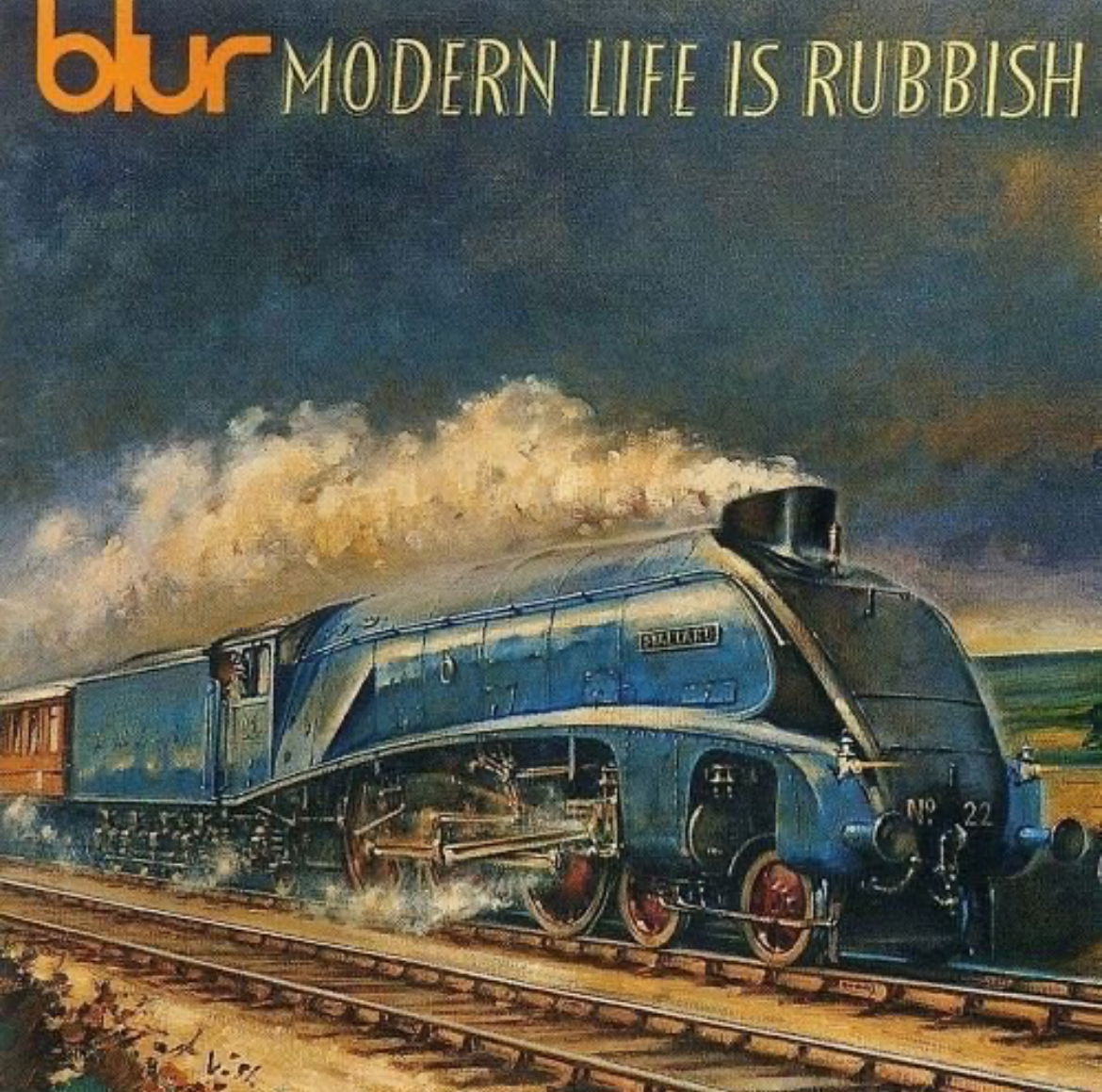
'Colin Zeal' is another highlight, a track brimming with sardonic humor. It's a commentary on the monotony of suburban life and the boredom that comes with it, all wrapped in a fast-paced, guitar-driven melody. The song's protagonist, Colin, is stuck in his routine, and Albarn’s lyrics, though delivered with a light touch, capture the essence of dissatisfaction many can relate to in the daily grind.
There are so many classics here. The album captures a band not only at their best but clearly on the rise. 'Modern Life Is Rubbish' proved that Blur were more than just another flash-in-the-pan indie band. Tracks like 'Oily Water' and 'Coping' are snarling, guitar-heavy attacks, while 'Sunday Sunday' leans into a music hall style, capturing a portrait of Britain much like The Kinks had done decades earlier.
I love this record. It’s packed with some of my favourite Blur songs. 'Parklife' was seriously unlucky to miss out. Really unlucky, in fact ,but 'Modern Life Is Rubbish' just edges it.
Sam Fender- Seventeen Going Under
'Seventeen Going Under' is, without a doubt, one of the most powerful and resonant albums in recent memory. It’s not just a collection of songs. It’s a deeply personal, politically charged, and emotionally raw coming-of-age story told through the lens of working-class life.
Written and performed by Sam Fender, a man who wears his roots with pride, the album is steeped in the grit and struggle of growing up in a world that often feels like it’s working against you. These songs are born out of hardship, frustration, and defiance—but also hope, love, and fierce self-awareness. This is music for the everyman and everywoman. For anyone who’s ever felt overlooked, underestimated, or like they had to fight just to stand still.
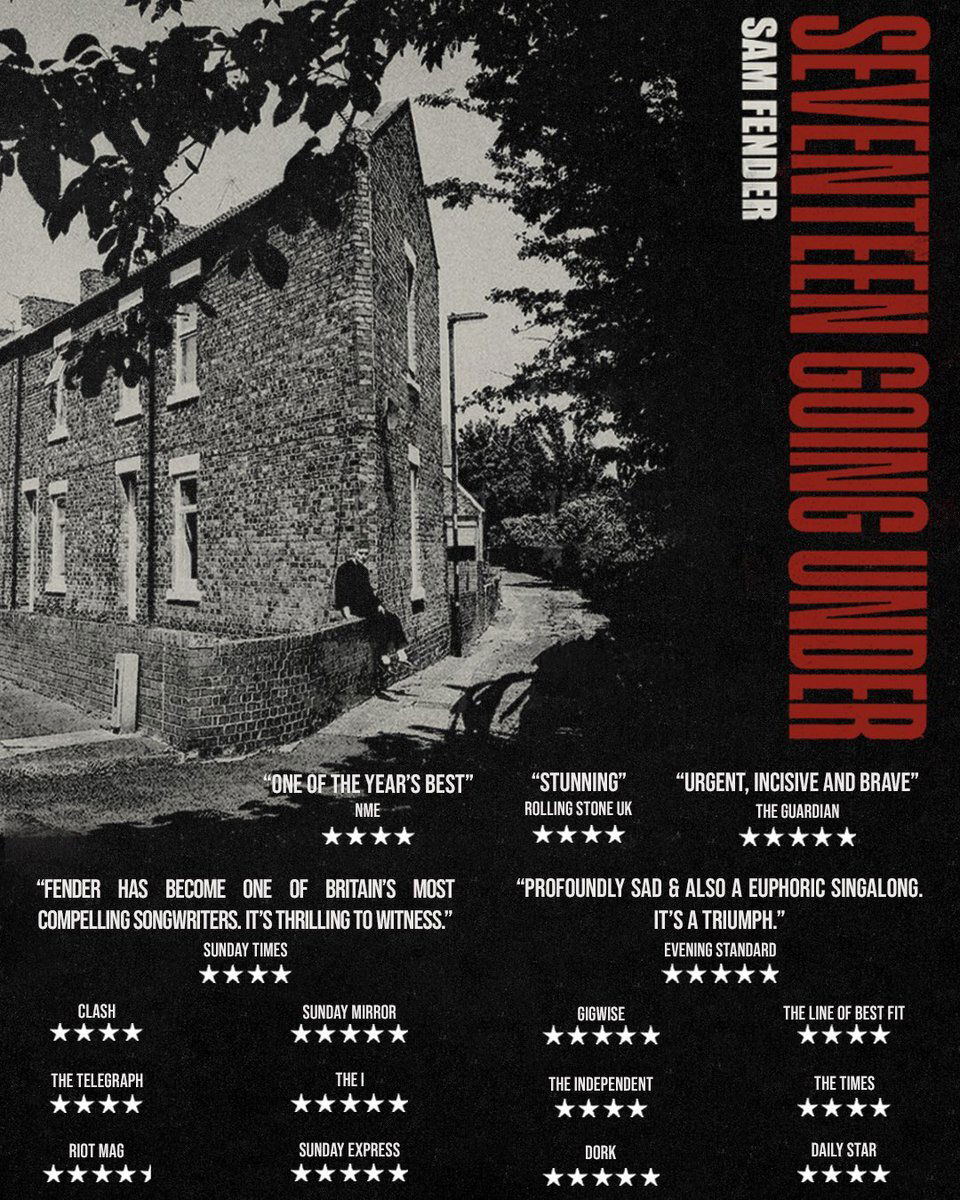
I remember hearing it all for the first time and being blown away. It tackles so much, both at home and with the wider world. Poverty, loss, love, war, relationships, parenthood, politics, mental health, self worth are all tackled on this record.
I proclaimed on this page that the title track is the best song of the last decade. ‘Spit of You’ perfectly sums up the relationship that many young men have with their dads. ‘Get You Down’ sees Sam look back at his youth and his struggles. ‘The Dying Light’ is a fitting tribute to North Shields and those he's lost along the way. ‘Aye’ and ‘Long Way Off’ look outward and try their best to question the way the world is now. Its a brilliant collection of songs,to which I can really relate.
One of those albums that upon its release got the praise it deserved, yet in future years I think we will be talking about it as one of he best British albums ever.
The Smiths- The Queen is Dead
Britains most important band and their most important album.
Evocative, provocative, brutal and beautiful, 'The Queen Is Dead' is a bold, unapologetic statement. From the very first note of the title track, it's clear this isn’t just another indie record, it’s a cultural moment. The opening song takes aim at the monarchy with a sneering irreverence not heard so powerfully since the Sex Pistols in 1977. It's subversive and cinematic, with Johnny Marr's churning, almost psychedelic guitar work laying the foundation for Morrissey’s theatrical disdain.
This is The Smiths at their creative peak. Morrissey was penning some of the most clever, gut-wrenching lyrics of his career, and Marr had fully cemented his status as one of the greatest guitarists of his generation. Crafting melodies that were complex, shimmering, and instantly iconic. Alongside them, Andy Rourke and Mike Joyce formed a rhythm section that was both subtle and essential: precise, propulsive, and effortlessly cool.
'There Is a Light That Never Goes Out' remains one of the most beloved and iconic songs in the band’s catalog—and with good reason. It’s haunting, cinematic, and impossibly romantic, capturing that mix of longing and drama that defines The Smiths
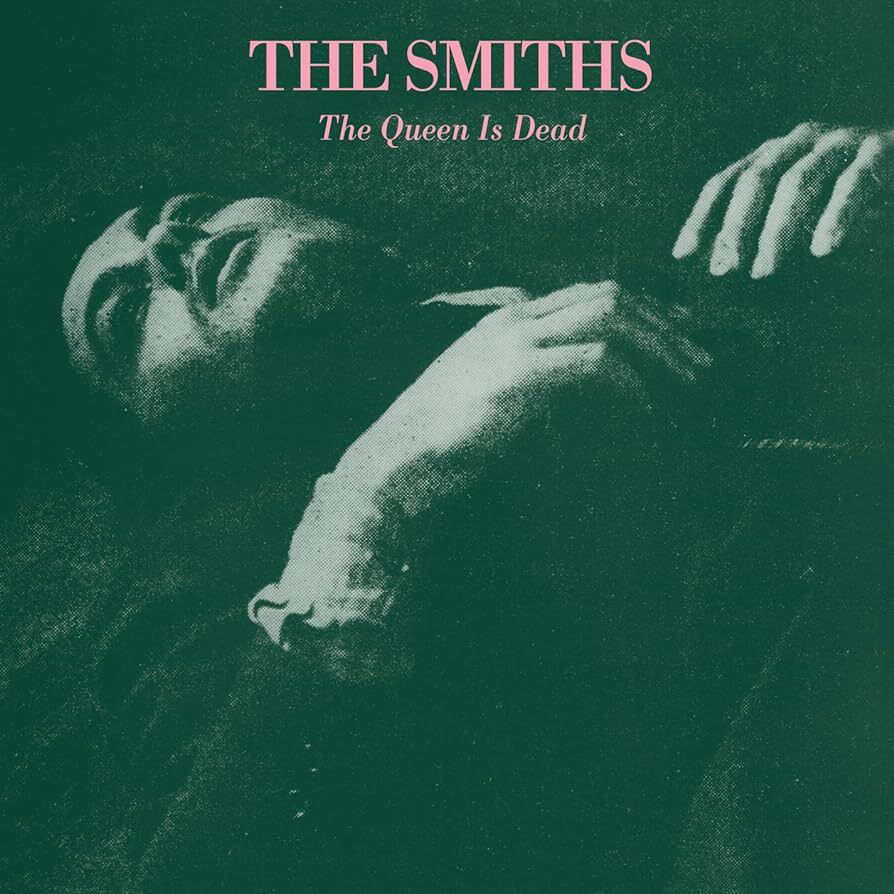
Then there’s 'Bigmouth Strikes Again', a rollicking, biting classic driven by Marr’s spiraling guitar lines and Morrissey’s sardonic wit. 'The Boy with the Thorn in His Side' might be one of the band’s most gently devastating songs, beautiful in melody, but full of frustration at being misunderstood by critics and the industry. It's personal, poetic, and quietly defiant.
But what makes 'The Queen Is Dead' truly great is its depth. It’s not just the hits—it’s the quieter, stranger corners that stay with you. 'I Know It’s Over' is absolutely crushing. A slow, soul-baring ballad that strips Morrissey down to his most vulnerable, with a vocal performance that aches with loneliness and resignation.
It’s a timeless collection of songs crafted by four of the most gifted musicians this country has ever produced. An album that changed what guitar music could be
Foals- Life is Yours
Another fairly recent addition but 'Life Is Yours' has more than earned its place on this list.
Ever since it's release its been on heavy rotation in my listening habits. Especially when the weather gets a bit warmer. It's the soundtrack to longer days, and warm weather and late nights.
This is a real summery record. A party record, that ironically was written when the world was locked down, and we could not go out and enjoy life. Despite the circumstances that it was written in. This record sounds free and liberating.
Musically, this is Foals leaning hard into groove and rhythm. It’s indie-pop with a dance pulse. Guitars shimmer instead of shred, the basslines bounce, and the percussion is alive. This is the kind of guitar music that belongs on the dancefloor. Think New Order, LCD Soundsystem, Primal Scream, The Killers, and now… Foals.
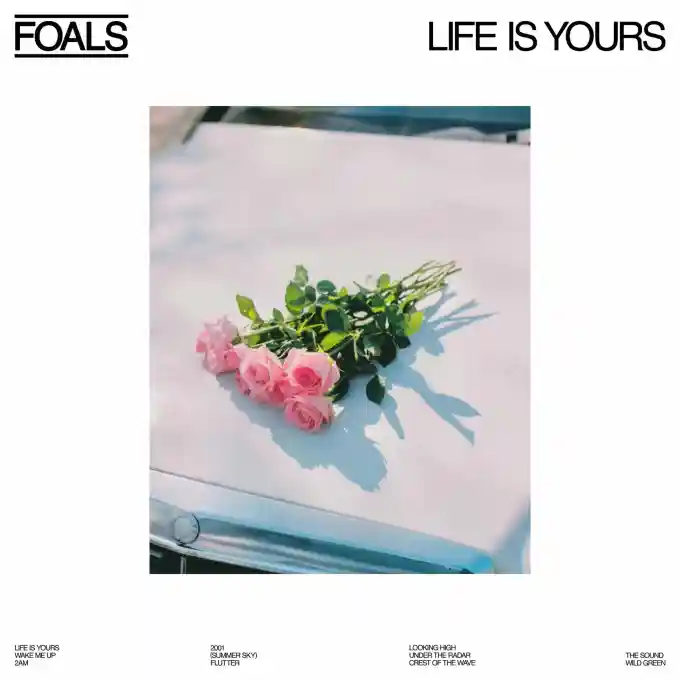
The title track 'Life Is Yours' sets the tone with crisp guitars and infectious optimism, it's like a sunrise in song form. 'Wake Me Up' bursts in with disco-funk swagger and a huge chorus built to be shouted from festival crowds. It’s a confident opening statement: Foals are here to make you dance.
'2am' is a highlight: bittersweet and euphoric at the same time, it captures that hazy, restless energy of late nights where you’re chasing something—fun, love, escape. 'Looking High' takes that feeling and floats with it, dreamy and nostalgic, while '2001' is pure sun-drenched bliss. Even deeper cuts like 'Flutter' and 'The Sound' are packed with groove, smart production, and that tight musicianship that’s always been Foals’ trademark, just dressed in something lighter and brighter this time around.
What really earns this album its spot on the list, though, is the shock factor. No one expected this from Foals. After the apocalyptic intensity of 2019’s 'Everything Not Saved Will Be Lost' double album, the last thing anyone thought they’d do next was drop a Balearic-fueled party record. No one! So when this arrived, it turned heads. Mine included.
But the surprise quickly faded into admiration. They pulled it off. It still sounds like Foals, tight, inventive, passionate, but with a looseness, a playfulness, we hadn’t seen before. It’s Foals in swimming trunks.
Courteeners- St Jude
An album can soundtrack a part of your life, this album soundtracks university. Especially the first year. Me and my friends saw the band quite a few times, especially in that period. The songs on this album have been woven into the fabric of our lives.
'St. Jude' is the reason we fell in love with The Courteeners in the first place. Those songs hit hard in 2008, and remarkably, they still resonate just as powerfully in 2025. In my opinion, it's their best record, the one that truly put them on the map.
The album opens with 'Aftershow', a punchy, bratty burst of energy that sets the tone immediately. It’s Liam Fray swaggering into your life with a smirk and a guitar. Then there’s 'Cavorting', which comes in snarling with its sharp lyrics and strutting beat, equal parts insult and invitation. It’s messy, confident, and completely addictive.
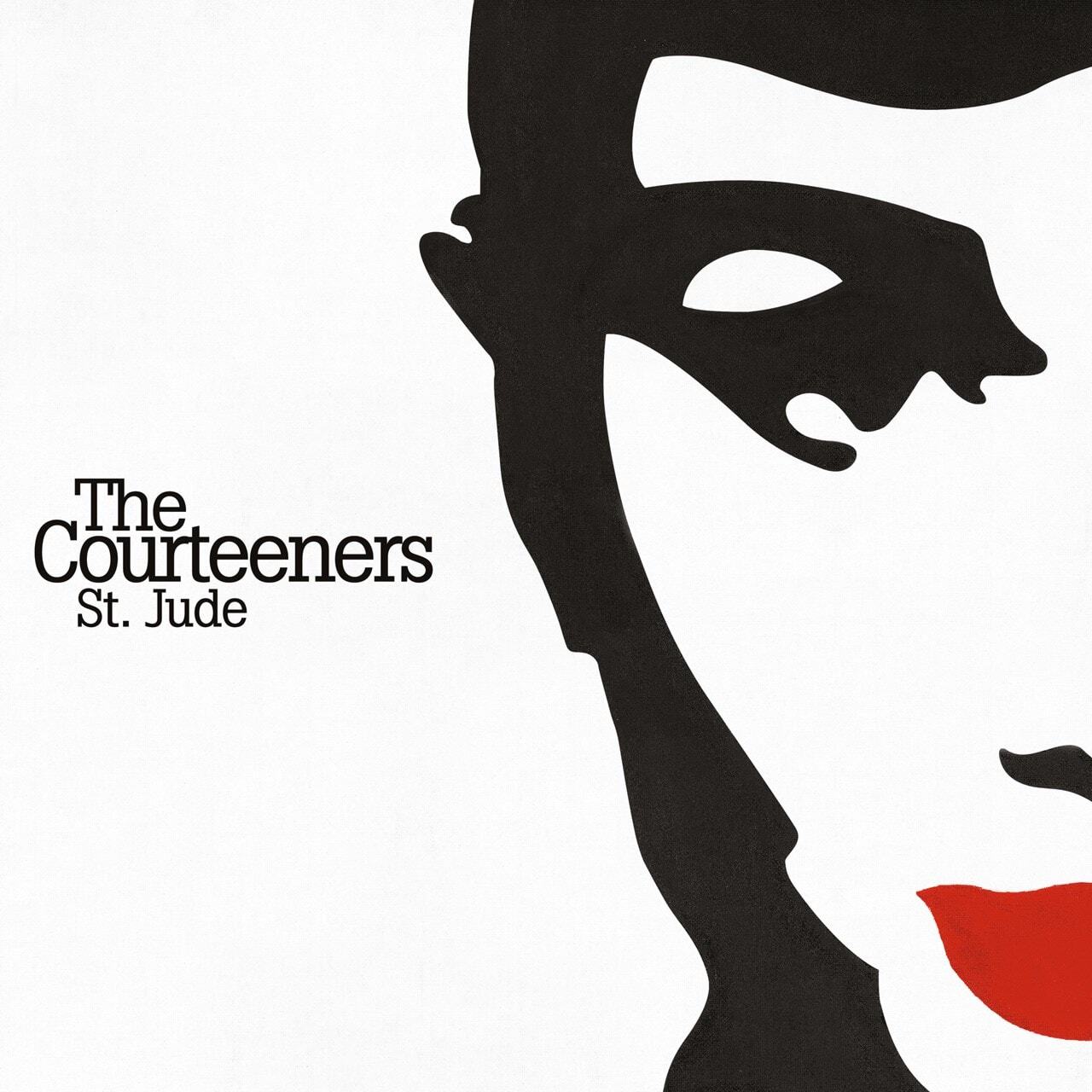
'What Took You So Long?' slows things down just enough to show the band’s more reflective side—a bittersweet anthem about timing, relationships, and the things we say too late. It’s got a huge chorus, but it’s grounded in real emotion.
Then comes 'Not Nineteen Forever', the undeniable anthem of the album. It’s funny, frustrated, hopeful it’s everything about growing up and not quite being ready for it. Everyone’s got a memory attached to that song. I've got far too many. Dark house parties, sweaty indie discos, a shipping flare and mud, lots and lots of mud.
It's a record that knows what it is, and who it's for. It had to make this list. I know it isn't the most glamorous or avant-garde pick but it's one of my favourites.
Noel Gallagher’s High Flying Birds- Noel Gallagher’s High Flying Birds
I've always gravitated more toward Noel Gallagher’s solo work than Liam’s, even if the latter's had greater commercial success and arguably a bigger cultural moment. For me, Noel's songwriting has always been superior, and his debut album with the High Flying Birds is a prime example of why.
Released in 2011, 'Noel Gallagher’s High Flying Birds' is a collection of some of his most inspired and fully realized songs since the heyday of Oasis. While I never had the chance to see Oasis live, I’ve seen Noel’s High Flying Birds several times, and many of the songs from this album have become staples of those gigs for a reason. They hold their own against the later Oasis catalogue and sometimes surpass it.
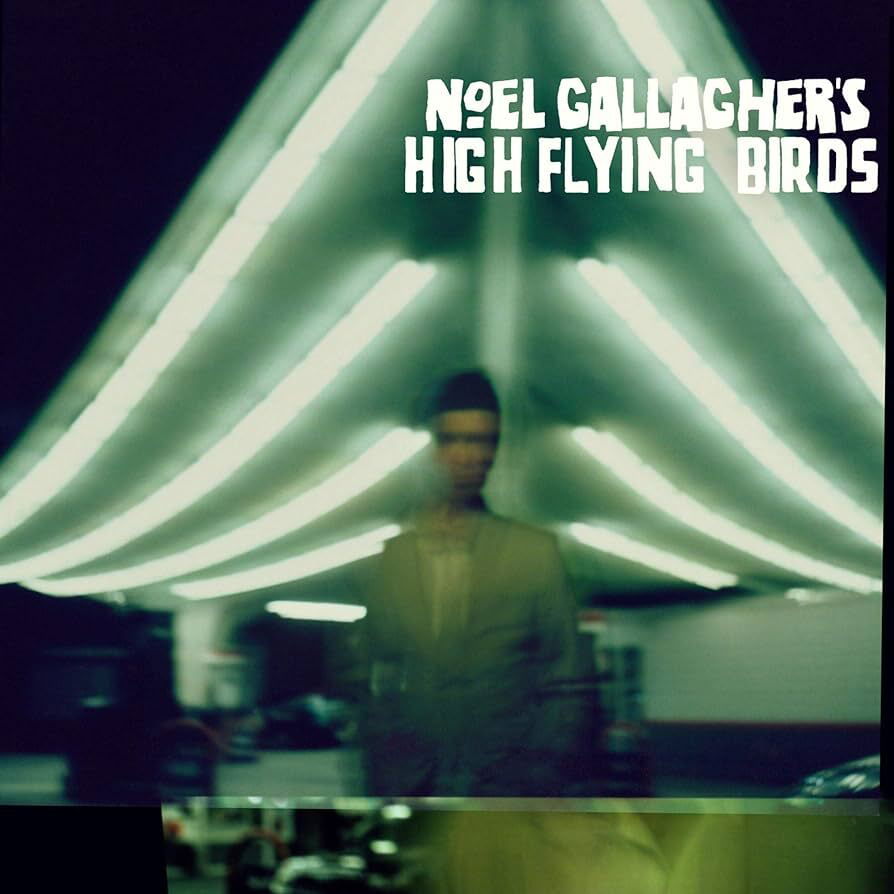
The record opens with 'Everybody’s on the Run', a soaring, cinematic track that immediately sets a different tone from the crunchier Oasis sound. Strings swell, drums echo—it's an ambitious opener that announces Noel's intent to evolve. Then there's 'If I Had a Gun…', a tender, melancholic ballad that harks back to classics like 'Slide Away' or 'Talk Tonight', full of longing and introspection.
One of the most intriguing turns is 'AKA… What a Life!', which dips into psychedelic and electronic influences with an infectious, almost danceable groove. A bold step away from the "meat and potatoes" stadium rock that had begun to define Oasis's later years. Tracks like 'The Death of You and Me' blend vaudeville swagger with melancholic undertones. This album paved the way for Noel's continued solo evolution, from orchestral experiments to full-on cosmic jams in later records. But this first outing remains special. It's the one I still come back to regularly. A formative album of my teenage years, and a modern classic in its own right.
Queen- Live at Wembley 1986
It might be seem as a bit of a cop-out putting a best of or a live album on a list line this. However I don't care.
This album takes me straight back to my childhood. I remember sitting in front of the TV with my dad, watching the live footage in awe. The energy of the crowd during 'Radio Ga Ga', the powerful call-and-response before 'Under Pressure', Freddie's heartfelt speech about the band staying together until the end it all left a huge impression on me.
The album captures Queen at their absolute best, with a setlist that spans their entire career. From the massive, era-defining singles to a few lesser-known gems, it’s a perfect showcase of everything that made Queen great. It’s not just a live recording, it’s a performance, full of emotion, charisma, and musical brilliance.
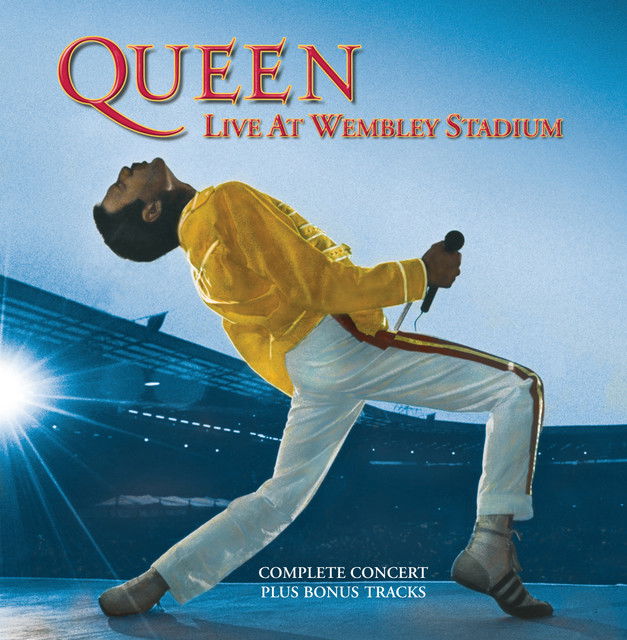
'One Vision' kicks things off with power and unity—a bold, anthemic opener that sets the tone for what’s to come. 'Tie Your Mother Down' keeps the energy high, showcasing Brian May’s iconic guitar work and the band’s rock edge. Then there’s 'A Kind of Magic', which brings a lighter, more playful energy while still feeling massive when played to a stadium crowd.
Moments like 'Who Wants to Live Forever' strip things back, letting emotion take centre stage. Freddie Mercury’s voice soars with both fragility and power, making it one of the most moving performances on the record. Of course, 'Radio Ga Ga' remains a crowd favourite—the rhythmic clapping and audience interaction turning it into something transcendent.
And then you’ve got the giants: 'Bohemian Rhapsody' as theatrical and surreal as ever, somehow even more powerful live. 'We Will Rock You' and 'We Are the Champions' close the show with pure triumph, uniting everyone in the crowd with a feeling of collective euphoria.
It was recorded at one of the band’s final gigs with the original lineup. And while it marked the closing of a chapter, it also stands as one of their most powerful moments. There’s a real sense of celebration in the music—of legacy, of connection, of saying goodbye without losing joy.
Every time I listen, I’m filled with nostalgia. I’m right back in front of that TV screen, wide-eyed and completely mesmerised. This is the album that sparked my love affair with Queen and made me take a massive interest in my dad’s record collection. It’s more than just an album, it's one of the many musical catalysts in my life.
Tame Impala- Currents
What can I say about 'Currents' that hasn’t already been said? It’s a masterclass in modern pop—arguably one of the finest collections of pop songs in the past decade. With this record, Kevin Parker didn’t just cement his place in music history; he became a full-blown pop star.
Where 'Lonerism' drew heavily from The Beatles and Pink Floyd, 'Currents' looks to a different lineage—disco, ABBA, and the shimmering textures of 80s synth-pop. Yet Parker’s psychedelic fingerprints are still all over it. The result is an album that sounds like nothing before or since: a kaleidoscopic blend of rock and pop that feels timeless, yet unmistakably modern.
The opener, 'Let It Happen', is a seven-and-a-half-minute odyssey that sets the tone perfectly—glitchy, hypnotic, and strangely euphoric. It’s a bold, genre-blurring introduction that practically dares you to follow Parker into uncharted territory.
'The Moment' captures the feeling of a turning point, both in life and sonically with driving synths and a rhythm that pulses like a heartbeat. 'Yes I’m Changing' slows things down for a moment of vulnerability and emotional clarity, a breakup anthem wrapped in warm, dreamlike textures.
Then there’s 'Eventually', where soaring melodies meet raw, emotional lyrics, a song about the painful but necessary process of moving on. 'The Less I Know The Better' has become iconic for a reason: its funky bassline, bittersweet storytelling, and infectious groove make it an instant classic.
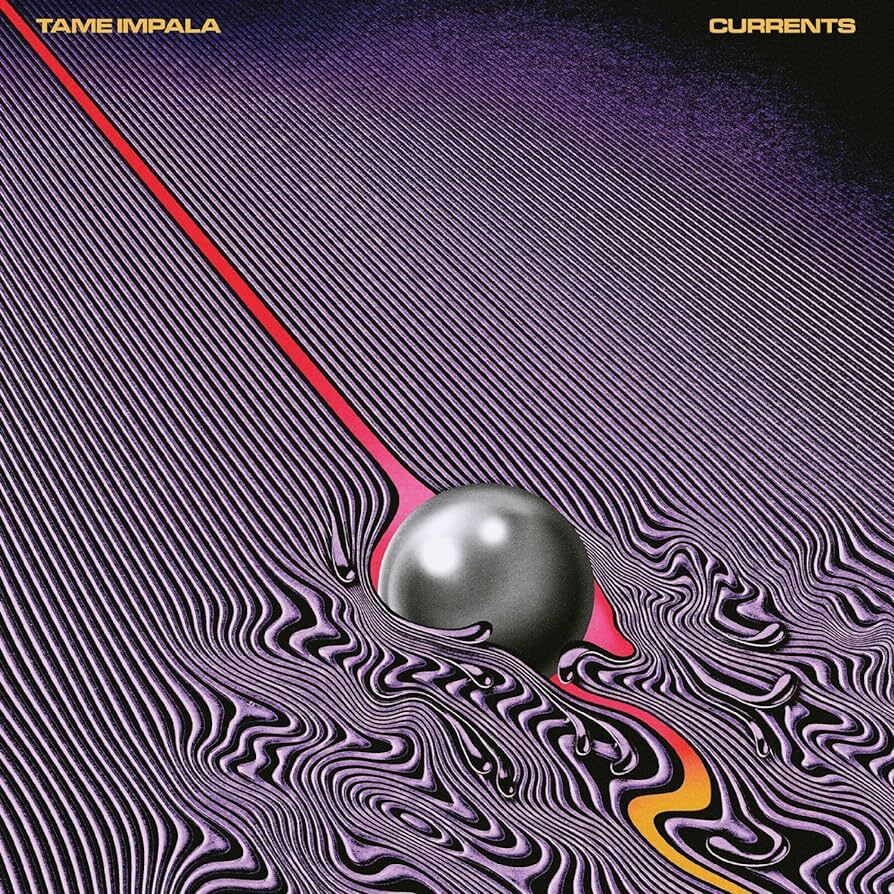
By the time we reach the closer, 'New Person, Same Old Mistakes', it feels like we’ve traveled far—not just through different sounds, but through personal growth and internal conflict. It’s a perfect bookend to the journey 'Currents' takes you on.
At 13 tracks and just over 51 minutes, the album never overstays its welcome. It flows seamlessly, like a single, vivid dream. One of the most pivotal albums of its time, 'Currents' didn’t just shift Kevin Parker’s trajectory it shifted pop music itself.
I just wish he’d tour the UK more. These songs were made to be experienced live.
The Jam- Snap
It’s a best of! The Jam had to make this list in some capacity, their songs have become part of my listening habits and they’ve influenced many of the artists on this list.
That said, I couldn’t pick just one of their studio albums. There isn’t a single record where every track stands above the rest—no clear front-runner. But what The Jam were, undeniably, was a brilliant singles band. Much like The Who before them.
That’s why 'Snap!' earns its place here. A definitive collection of the band’s best work, released just a year after they split, it captures the full arc of their short but explosive career. From the raw punk energy of their debut single 'In the City', with its buzzsaw guitars and snarling defiance, to the Motown-tinged melancholy of 'The Bitterest Pill (I Ever Had to Swallow)', this compilation is a masterclass in sharp songwriting, social commentary, and musical evolution.
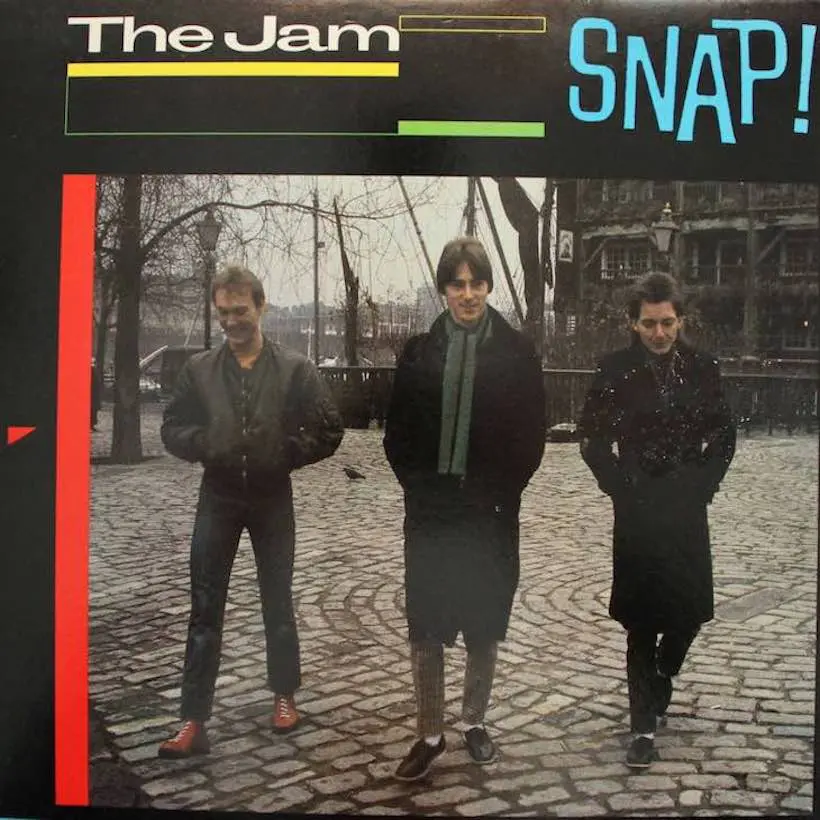
Going Underground', with its urgent bassline and anti-establishment message, is as powerful now as it was in 1980. 'That’s Entertainment' is a poetic, almost spoken-word reflection on working-class life in Britain—bleak, beautiful, and completely iconic. And of course, there’s 'Town Called Malice', a northern soul-inspired anthem of frustration and hope, packed into just under three minutes of brilliance.
But 'Snap!' goes deeper than the big hits. 'Smithers-Jones' is a biting critique of the rat race, written from the perspective of a man chewed up and spat out by the corporate world—set to an unexpected string arrangement that gives it real weight. 'Thick as Thieves' captures the nostalgia of lost youth and broken bonds with a defiant punch. 'Strange Town' is a jangling tale of alienation and urban life, while 'The Dreams of Children' blends dreamlike textures with disillusioned lyrics, showing the band’s more experimental side.
As best-ofs go, this is a very, very good one. It’s not just a collection of hits—it’s a portrait of a band who evolved rapidly, burned brightly, and left behind a catalogue that remains timeless. The Jam were one of Britain’s greatest singles bands, and 'Snap!' is the perfect entry point for new listeners and a treasure trove for long-time fans alike. This record is one of my most treasured albums, it had to make the list.
The Verve- Urban Hymns
An album that marked a turning point in British music. 'Urban Hymns' didn’t just top the charts it dethroned Oasis’s 'Be Here Now', signaling a shift in the cultural tide and cementing The Verve as one of the UK’s biggest and most beloved bands. It’s a record packed with some of the most iconic songs ever written and recorded by a British group, and its impact still resonates today.
The singles alone are extraordinary works of art. 'Bitter Sweet Symphony' is a soaring, string-laden epic that marches forward with an almost defiant sadness. Its sweeping instrumentation contrasts with some of the most sorrowful lyrics ever sung in British pop simultaneously uplifting and devastating. 'The Drugs Don’t Work', the band’s chart-topping Number One single, is a hauntingly beautiful track that perfectly captures the comedown after the Britpop highs. Stripped-back and melancholic, it brings the decade’s hedonism crashing back to reality with aching vulnerability. 'Lucky Man' continues in a more hopeful tone, with one of Ashcroft’s most poetic and enduring lyrical performances. A song that still feels relevant and resonant decades later. With 'Urban Hymns', The Verve didn’t just reach the mainstream, they changed the face of British music.
Yet, the band’s psychedelic roots remain firmly intact. Tracks like 'The Rolling People' harken back to their earlier, more experimental sound, with swirling guitars and hypnotic grooves. 'Space & Time' is a standout, seamlessly blending the past and present—Ashcroft’s introspective lyrics elevated by Nick McCabe’s transcendent guitar work. The song showcases a band unafraid to evolve, while staying true to the essence that made them great.
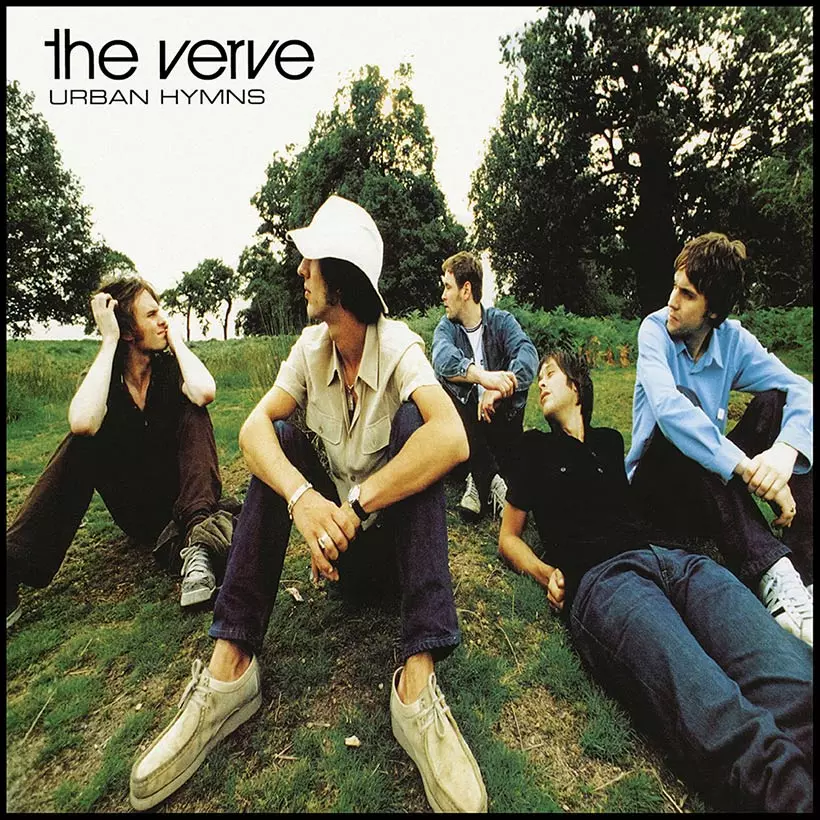
'Urban Hymns' is a collection of songs that somehow manage to feel both timeless and deeply rooted in a particular moment. Years later, it still sounds fresh emotional, raw, and beautifully crafted. It’s not just one of the defining albums of the ‘90s—it’s one of my most treasured records. A reminder of a time when music could still stop you in your tracks and say something that felt like it was meant just for you.
The 1975- I Like it When You Sleep For You are So Beautiful Yet So Unaware of It
The award for the longest album title goes to. I've really go into The 1975 over the last couple of years and it was a toss up between a couple of records for this list. I picked the band second album. Its an album full of brilliantly crafted pop songs.
Influenced by the 80s and tackling fame, addiction, love, lust and grief. Its an album that showed that The 1975 were not some flash in the pan indie band. They are here to stay.
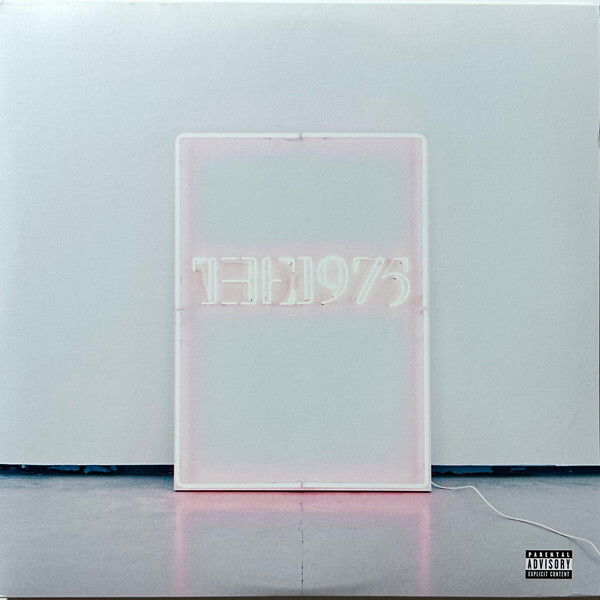
With pop bangers like 'The Sound' and 'She’s American' paired alongside introspective tales of relationships ('A Change of Heart') and addiction ('Paris'), and even a brilliantly chaotic punk-leaning track about the trappings of fame ('The Ballad of Me and My Brain'), this is some of The 1975’s best work to date.
The album never really lets up. 'The Sound', for instance, explodes not just in its anthemic chorus but also in its infectious, self-aware verses that critique both relationships and the self. 'The Ballad of Me and My Brain' is a raw, almost surreal anthem that tackles mental health and the disorientation of fame. At first it might seem absurd, but after a few listens, it becomes a revealing window into frontman Matty Healy’s mind and the strange whirlwind of sudden celebrity.
The record showcases Healy’s gift for crafting irresistible pop songs while proving he’s got something to say—often turning his sharp lens on the world around him, and frequently, on himself. 'A Change of Heart' features one of the most brutally honest lyrics about drug addiction. While rock stars often romanticize their struggles—like Noel Gallagher’s “what tongueless ghost of sin crept through my curtains?”—Healy is starkly grounded: “You look shit and you smell a bit.”
The whole album is packed with sharp, witty, and emotionally cutting lyrics. 'Loving Someone' offers: “I’m the Greek economy of cashing intellectual cheques.” In 'A Change of Heart': “And you were coming across as clever / Then you lit the wrong end of your cigarette.” And in 'The Sound': “We left things to protect my mental health / But you’ll call me when you’re bored and you’re playing with yourself.”
Healy’s sincerity shines throughout. 'Nana' is a tender tribute to his grandmother, one of the most soul-baring moments in his songwriting. 'She Lays Down' tells the story of his mother’s struggle with postnatal depression—it’s simple, stark, and deeply affecting.
Even nearly ten years on, this collection of songs still sounds fresh and brilliant. Yes, it nods to INXS, Bowie, Peter Gabriel, The Police, Hall and Oates but it remains unmistakably a 1975 record.
Haim- Women in Music III
I feel like this album fits perfectly here. A collection of different sounds and genres. That sees Haim create their most direct and impactful record to date.
It has everything from 00s garage, to 70s Fleetwood Mac, and soulful acoustic ballads. A really well worked outfit of songs. Each one sounding different and unique. It's somehow vulnerable, punky, and soothing.
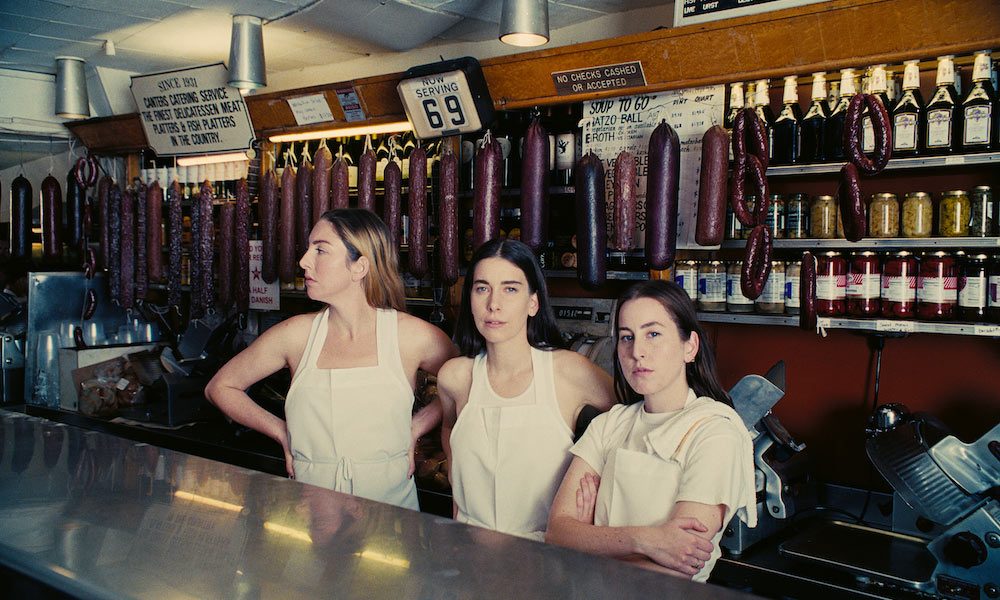
An emotionally charged record that sees the three sisters tackle some of their most sensitive subjects to date. Whether that be the loss of a friend, or misogyny in the music industry. The songs do not suffer though, in fact these are the best songs the band have ever written. In an interview with the NME, Alana Haim said "The whole mantra of this record is about being fearless and not holding yourself back". The songs on this album reflect this statement, the songs are delivered in such a confident way.
The band push themselves, experimenting with electronics, jazz saxophones and even 90s R&B. Despite the different sounding songs, the whole album flows and nothing feels out of place, the band have made a record on their own terms, moving away from what many expected them to do next. It's one of the best albums of recent memory.
Pulp- Different Class
Pulp took a long time to become stars, originally forming in 1978, they didn't get relative success until 1994 with the album 'His n Hers'. One year later though with 'Different Class' they arguably released the definitive album of the Britpop movement.
The record reached Number One, and won the 1996 Mercury Prize. It gave the band Four Top 10 singles 'Sorted for E's & Whizz', 'Disco 2000', 'Something Changed' and 'Common People'. These songs weren't just lager chugging festival anthems, they were well crafted pop songs, that cackle social class, sex, relationships, drugs and growing up with bitingly clever lyrics and nuance. Jarvis Cocker the bands songwriter grasps nuance and language to craft brilliant portraits of British suburban working class life.
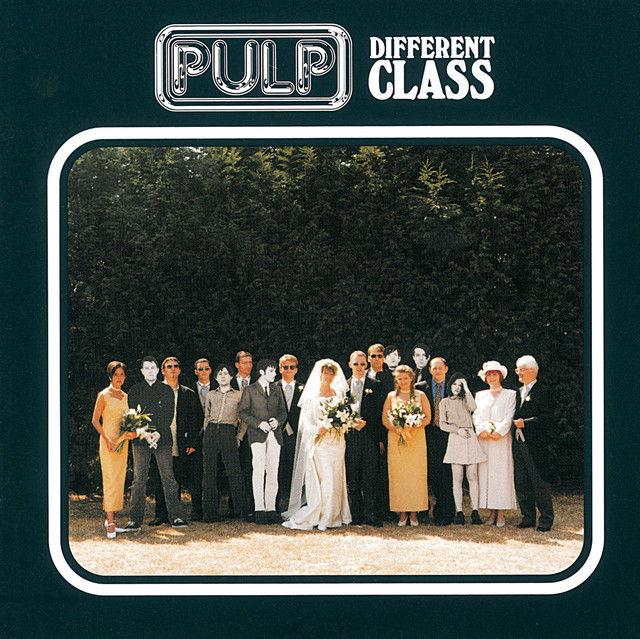
The songs on this record are brilliant, and they have all aged really well, theirs a sense of melancholy throughout. 'Disco 2000' tackles growing up and the growing apart in vivid description, no stone is left unturned.
'Sorted for E's & Whiz' sees the band talk about the illegal raves of the 80's and 90's but not as someone swept up in the mass drug fueled euphoria, instead as a doubtful bystander Is this the way they say the future's meant to feel?” he muses disconsolately, “or just twenty-thousand people standing in a field?
'Common People' is still one of the greatest songs ever recorded by a British band. It’s a biting commentary on the naiveté and privilege of those who view working-class life as some sort of exotic experience, like a cultural playground they can dip into for fun. Written about Jarvis Cocker's conversation with a wealthy girl. . She longs to experience "slumming it" in the gritty streets of London, a sentiment that Cocker’s character sees as hollow and offensive. "You’ll never live like common people," he sings, because she’ll never face the actual struggles that define working-class life
The End
So that brings the list to an end, some records have been unlucky to miss out. Ask me next week its ‘Performance & Cocktails’ instead of ‘Word Gets Around’. It's ‘Parklife’ rather than ‘Modern Life is Rubbish.’
There's been some that didn't make the list at all. Young Fathers, 'Heavy Heavy', Peace ‘In Love’ and New Order ‘Power Corruption & Lies’ just to name a few.
Its a list that I'm happy with, however. These records have soundtracked pivotal moments of my life. From childhood to present day. I have memories associated with them all. Both good and bad.
Music has been an ever pressent constant in my life and these albums have been spun, streamed and played hundreds of times. Soundtracking the journey, providing snapshots of moments, being the moment themselves.
We all have the songs and albums that are close to our hearts. These 25 are mine.
Thank you for reading x